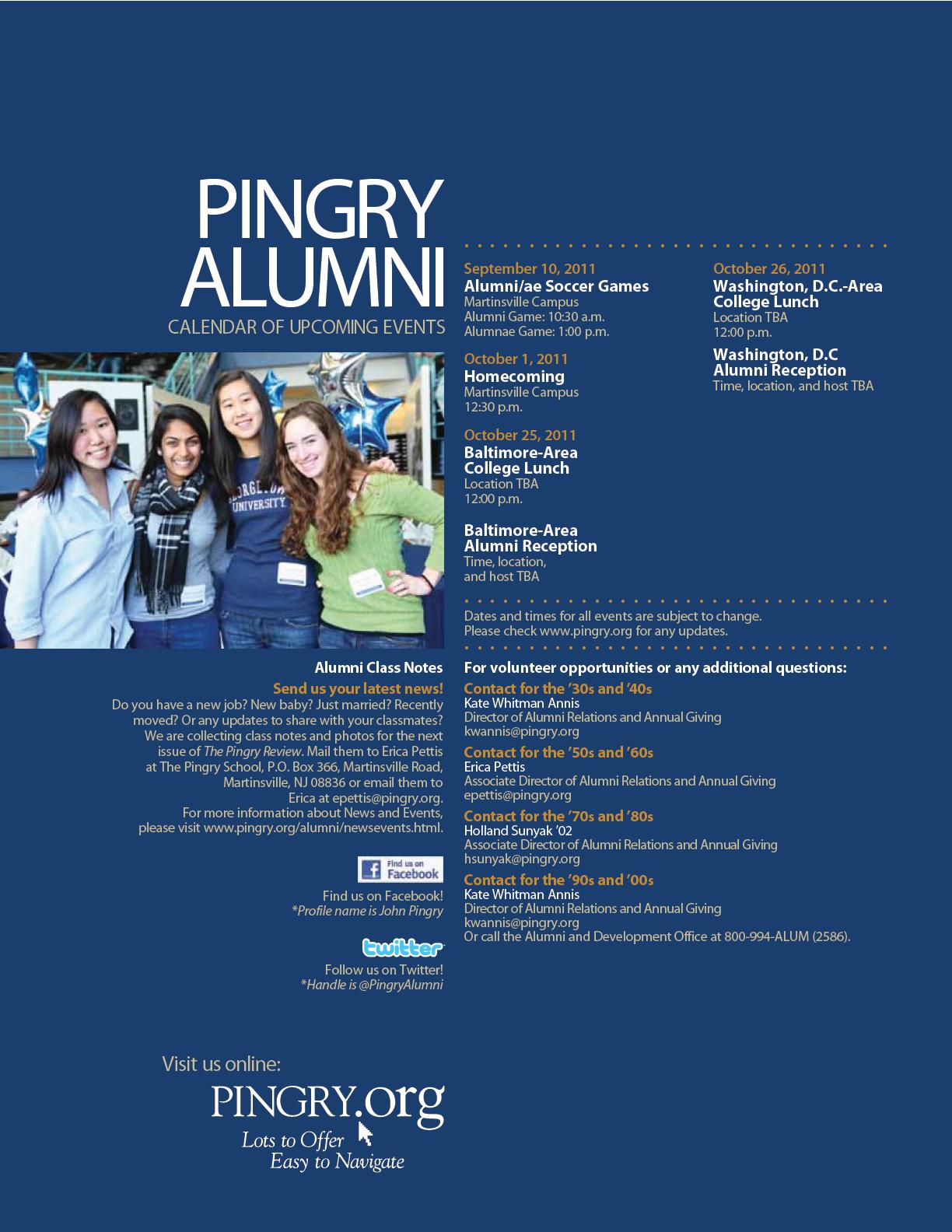





honor code:
The Honor System and Honor Code are in their sixth decade of simultaneous existence. This issue’s cover story explains the roots of each and describes new traditions at both campuses intended to keep the spirit of the Honor Code alive every day.
On the cover:
Pingry’s
4
How I Found John F. Pingry
After reading The Beginning of Wisdom, the story of Pingry’s first 100 years, Bob Popper ’61 wanted to find Dr. Pingry’s resting place. In this article, Mr. Popper shares his investigative story.
27 Prestigious Chinese Network Welcomes Pingry as a Member
Pingry will benefit from the resources of the Hanban-Asia Society Confucius Classrooms Network, which helps develop and support high-quality Chinese language education.
28 Touch and Go: early Access to Interactive Technology
Kindergarten and second-grade students are using iPads to supplement what they learn in the classroom. These revolutionary devices are making a big difference in the learning process.
31 Record-Setting Pingry Swimmer is One Step Closer to Olympics
Nic Fink ’11 has qualified for two events at the 2012 United States Olympic Swimming Trials. Read about the accolades and attitude that have helped him reach this milestone.
37 Alumni Portal Opens a New Door to Information
A new feature on Pingry’s web site, the password-protected alumni portal provides access to helpful and important information, including an online form to submit class notes.
38 en Garde! Fencers Learn from Olympian Dan Kellner ’94
Mr. Kellner, an Olympic fencer, is using his new club to give back to the community and help train the next generation of fencers.
3 From the Headmaster
4 Sesquicentennial
10 Scene Around Campus
27 School News 35 Alumni News
46 Ask the Archivist
47 Class Notes
62 In Memoriam
64 Dictum Ultimum
65 Alumni Calendar
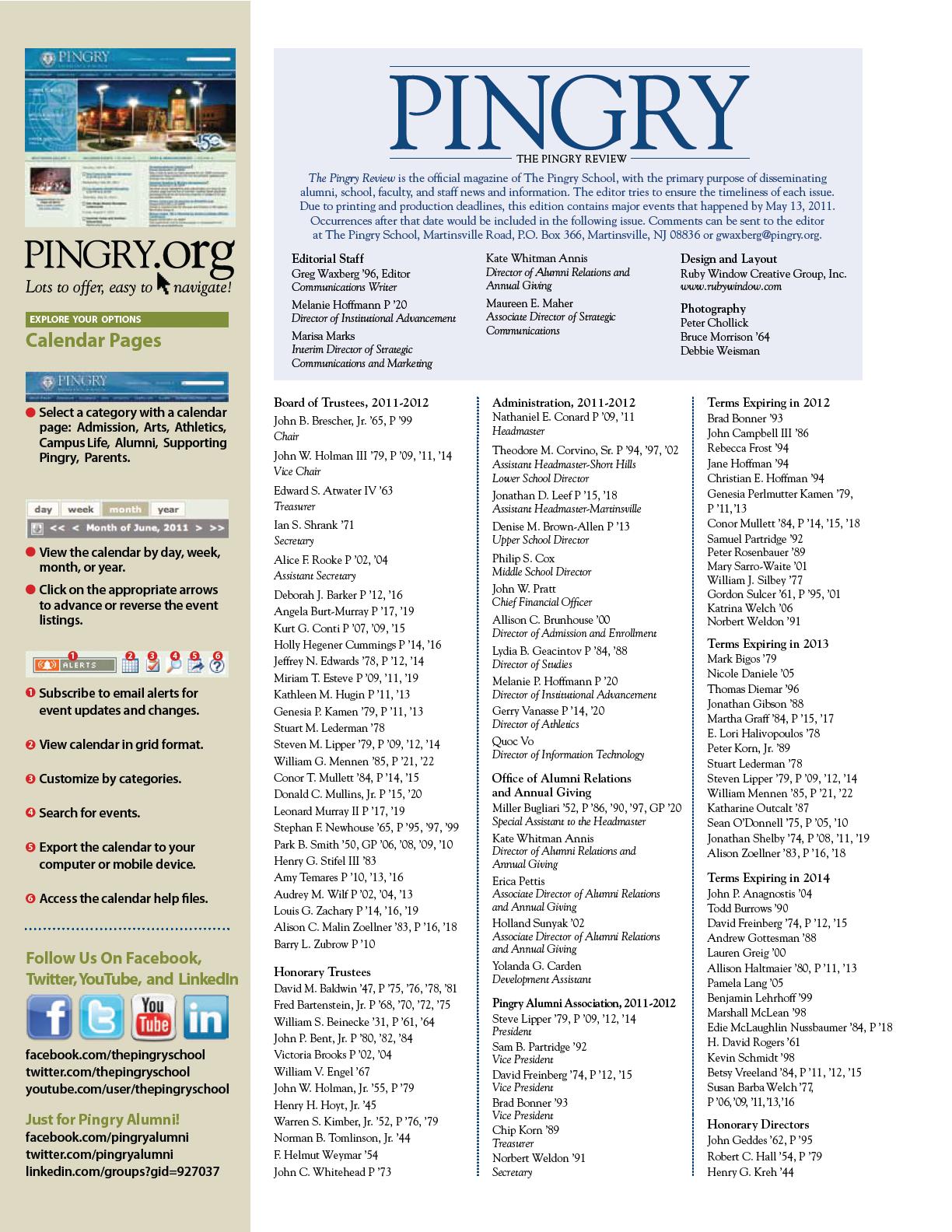

Headmaster Nat Conard P ’09, ’11, his wife Brenda Hamm P ’09, ’11, and their daughter Rebecca Hamm Conard ’09 shared a proud moment on Commencement Day 2011 when Ben Hamm Conard ’11 was among the graduates. Both Mr. Conard and Ben sported identical commemorative Sesquicentennial ties.
In the six years that I have had the privilege to serve as Pingry’s headmaster, I have had conversations, long or short, with many hundreds of alumni, from those who received their diplomas from my hand, to those who received theirs from Charles Bertram Newton. Regardless of when they graduated, regardless of the teachers and coaches who inspired—or intimidated!—them, and regardless of the strong and enduring friendships they formed while at Pingry, one core value that they all share is a firm and ever-growing belief in the tenets of the Pingry Honor Code. In this, Pingry’s sesquicentennial year, we continue our exploration in the Review of the themes that have carried us through our first 150 years and that will sustain us in our next 150. And of those themes,
nothing is more central to the ethos or success of the school than the Honor System and Honor Code. Born 85 years ago, these principles have formed the foundation for the educations and lives of thousands of Pingry alumni and, through their impact on the Pingry community, thousands of families.
Although I cannot back up this assertion with hard data, it is my very clear impression that the Pingry Honor Code has had a more profound impact on those who have been associated with it than most honor code institutions can claim.
I believe that this is a direct result of the way in which the Honor Code is framed. Where many institutions have chosen to define their honor codes negatively, in terms of proscribed behaviors, Pingry has chosen to present the Honor Code as source of positive guidance. As a result, as Pingry graduates move on to college and on into the “real” world, they see the Honor Code’s relevance to every facet of their lives.
As you read the articles in this issue of the Review, and especially as you read the personal Honor Code reflections of students, parents, and alumni, I hope you will find that they resonate with your own experience of the Honor Code and its impact on your life and the choices that you have made. We would love to hear your thoughts on this— and any—subject.
And, of course, we hope that we will see you on campus for one or more of the 150th anniversary events that we are planning throughout the next year. Come back—you’ll be glad you did!
Sincerely,
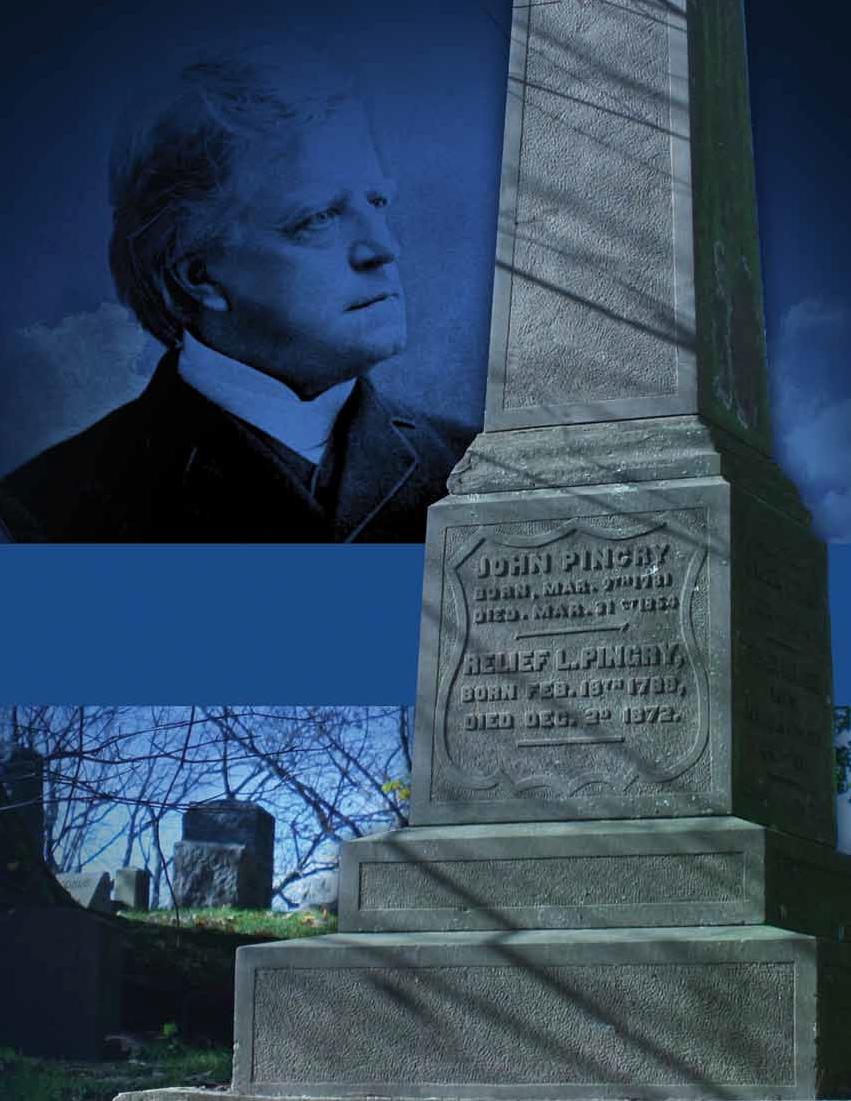
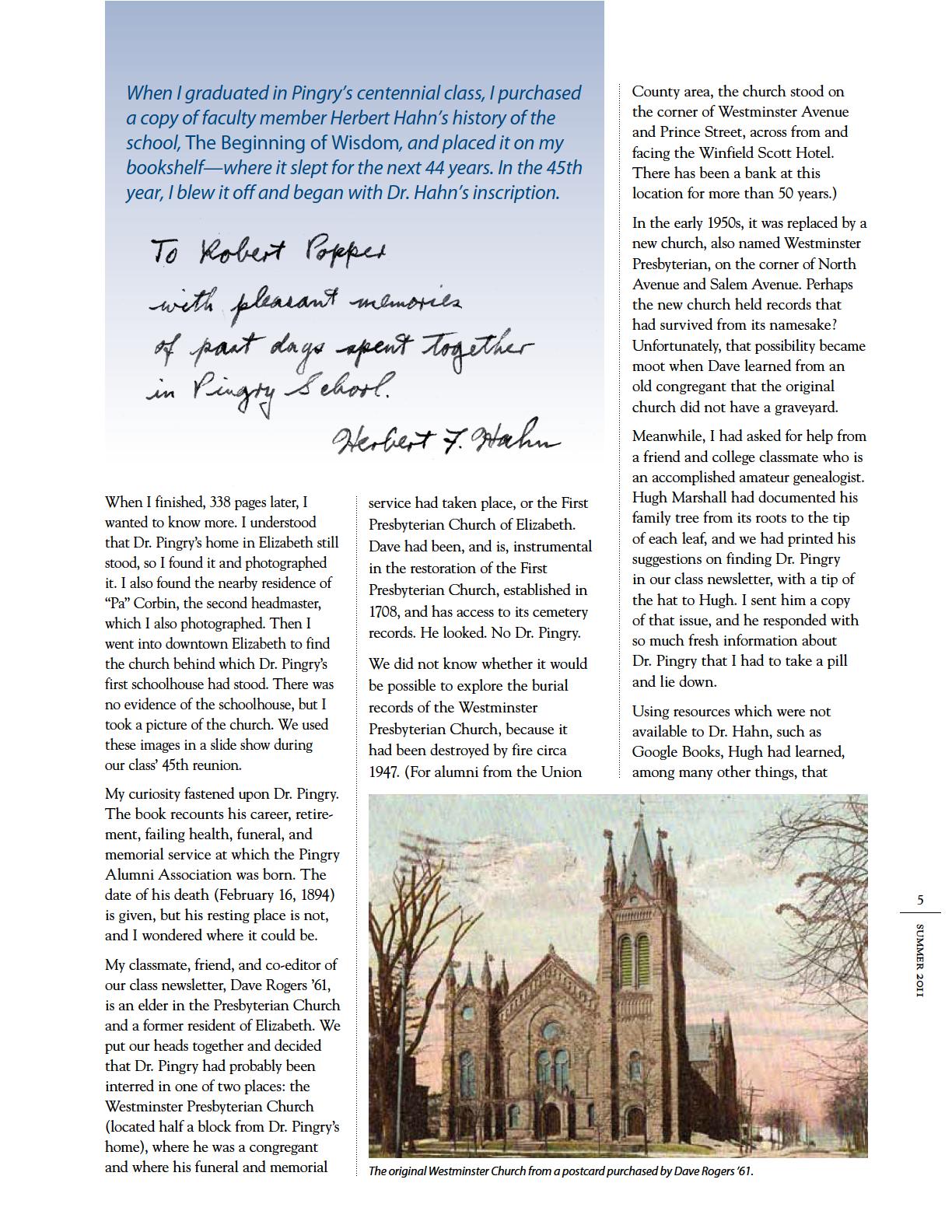
Dr. Pingry had three sons and one daughter, Julia, who had died giving birth. Julia, and her son who died two weeks later, were buried together in Rosedale Cemetery. Also interred at Rosedale was Dr. Pingry’s daughter-in-law, Rebecca Pingry, the wife of his son John. While Hugh had found a New York Times item of February 7, 1894, with the lead “The Rev. John F. Pingry Dying,” he found no subsequent reports. He surmised that Pingry was buried in Rosedale or in a family plot in Massachusetts, but that he was certainly not cremated.
I thought it might be worth visiting the Elizabeth Public Library and digging into back copies of the Elizabeth Daily Journal. I found something interesting. A two-paragraph account of Dr. Pingry’s funeral ends with “The interment took place at Orange.” Orange? This could have meant a cemetery named Orange or the town of Orange, New Jersey. Googling revealed no such cemetery, but it did teach me that the 92-acre Rosedale Cemetery, founded in 1842, is within three cities: Montclair, West Orange, and Orange! I called Rosedale and asked whether they had a John Francis Pingry, interred in February 1894. The woman excused herself for a few minutes of research, then told me that they did not.
Five months later, in November 2008, Hugh and I visited Rosedale on a Sunday morning, and I asked the same question. We came fortified with a copy of the Elizabeth Daily Journal item, as well as everything from our Internet searches. The manager produced a typewritten page which listed the occupants of lot number 515, eight individuals in all. None of the interment dates were
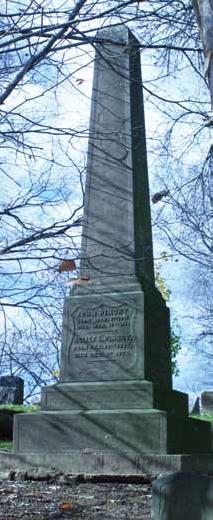
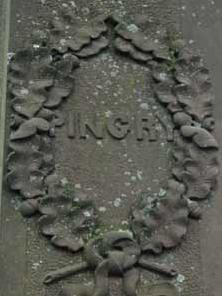
within two years of 1894, although every individual was either a Pingry or, apparently, a close relative of a Pingry. For example, one read “Daughter of Rev. John” while another was “Wife of Rev. S. [sic] F. Pingry.”
The manager also produced index cards, each of which seemed to correspond to a name on the typed page. The entries were written in a careful hand, perhaps with a quill pen. The cause of death was shown for some, such as dropsy, or a head fracture in the case of a wife of Rev. Pingry. (He had three.) But there was no card for our subject; the manager explained that a fire had destroyed some of the cemetery’s records. I was disappointed. I should have listened to the woman on the phone.
Then he removed from the vault an ancient ledger with worn leather binding. I repeated the date of death and the manager’s finger stalled on the page. “Here he is,” he said, and turned the book so we could read the entry, written in another time. Yes, John F. Pingry was in lot number 515, and he was the 10,874th person to be buried at Rosedale.
We followed an employee who drove a pickup truck to the “Old Cemetery” and, after a brief search, we found a stone obelisk about 10 feet tall.
Several feet below the top, on one side, was a carved wreath with the word “PINGRY” centered within.
Near the base, in relief on each of the four sides, were commemorations of different members of the Pingry family with dates of birth and death. One side was dedicated to Rev. John F. Pingry (1818-1894) and his second wife Elizabeth.

One of the sides adjacent to it was reserved for his first wife Caroline and a daughter who had lived for fewer than two years. The other adjacent side remembered his daughter Julia, who had died giving birth, together with her son. This confirmed what we had learned on the Internet. And the fourth side, opposite that of John F. Pingry, was for a John Pingry (b. 1781, d. 1854) and a Relief L. Pingry (b. 1789, d. 1872) who, I confirmed later, were John F. Pingry’s parents. They lived with their son in their later years.
In the ground near the base of the monument were eight or more footstones, each about the size of a large hardbound book and appropriately separated from its neighbor above or below. Within the outline of a shield, each bore only three initials, and one such was marked “J. F. P.” We had found our man.
Nearby was a pair of headstones which were less cryptic. One was inscribed “JOHN PINGRY / SON OF / REV. J. F. & C.G. PINGRY / 1846-1910.”
Its mate read “REBECCA B. COBB / WIFE OF / JOHN PINGRY / 18461882.” This, too, confirmed what we had learned on the Internet.
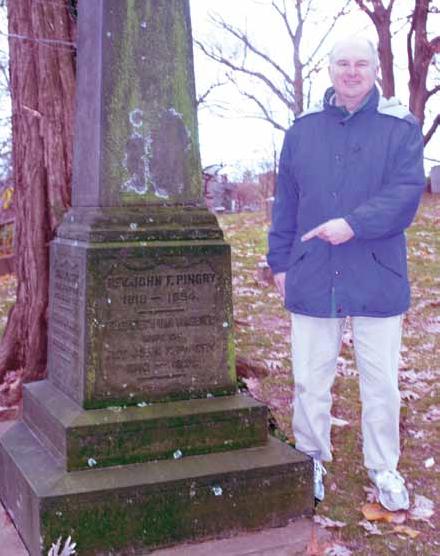

Later, when I re-examined the typed page produced by the cemetery manager, I realized that I had overlooked something important. It clearly stated that the owner of the family plot which we had been studying, lot number 515, was “Rev. John Pingry.”
When we returned to the office, the manager asked whether the person whom we had found had any connection to The Pingry School. I replied that he was the founder and that I am an alumnus. He then volunteered that several members of his Board of Directors are Pingry graduates—namely, Bob Baldwin ’59, P ’96, ’01, Terry Talcott ’56, and Jack Angell ’57, P ’90 (recently resigned). I wonder whether these Pingry boys know whom they have had in their care!
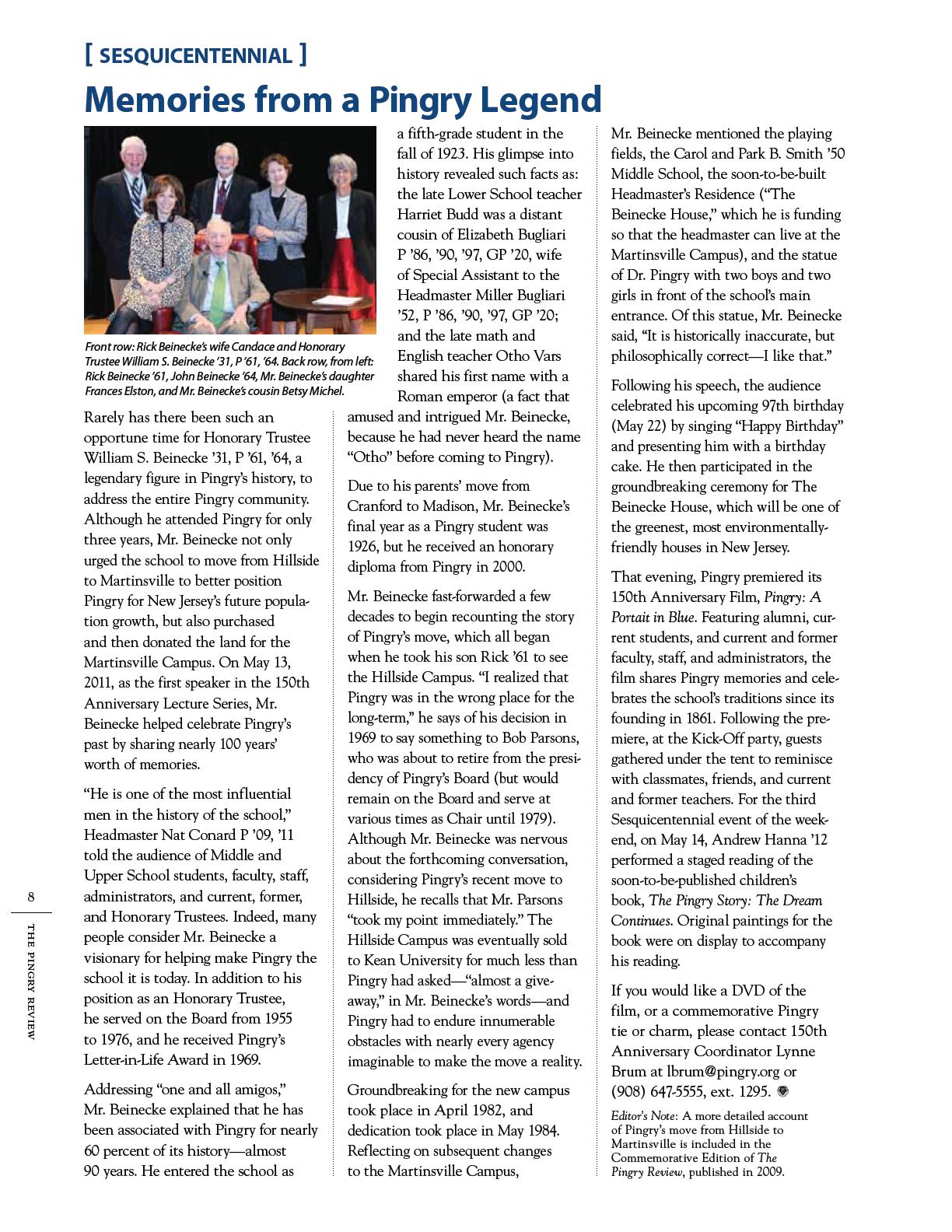
For the second presentation in Pingry’s 150th Anniversary Lecture Series, “Celebrating Pingry’s Proud History,” and for the 12th John Hanly Lecture on Ethics and Morality, John Quiñones will visit Pingry on October 14, 2011. Mr. Quiñones hosts ABCTV’s What Would You Do?, a program that uses hidden cameras to test people’s reactions to common ethical dilemmas.
The 150th Anniversary film, Pingry: A Portrait in Blue, is available on Pingry’s YouTube channel.
Dr. Andrew Moore, Chair of the Music Department, is planning a student performance for alumni and parents on April 29, 2012, in the newly-renovated Enlow Recital Hall at Kean university (the former Hillside Campus). In addition to being a wonderful opportunity for current students, this concert will also provide alumni with an occasion to return to the campus. Also planned are a pre-performance reception in the Fiske Garden, a post-performance dessert reception with the performers, and a tour of the former Pingry campus.
Those alumni who traveled to Bermuda as students with Special Assistant to the Headmaster Miller Bugliari ’52, P ’86, ’90, ’97, GP ’20 will be pleased to hear that a return trip to Bermuda with Mr. Bugliari is being planned for June 28 to July 1, 2012, at Tucker’s Point Hotel & Spa—a unique way to rekindle memories and reconnect with friends and classmates. In Mr. Bugliari’s words: “Revisit the scene of your youth, and, this time, behave.” Travel packages are being organized and will soon be publicized with the assistance of Travelong Inc. of Summit.
For more information about these or other Sesquicentennial events, contact 150th Anniversary Coordinator Lynne Brum at lbrum@pingry.org or (908) 647-5555, ext. 1295.
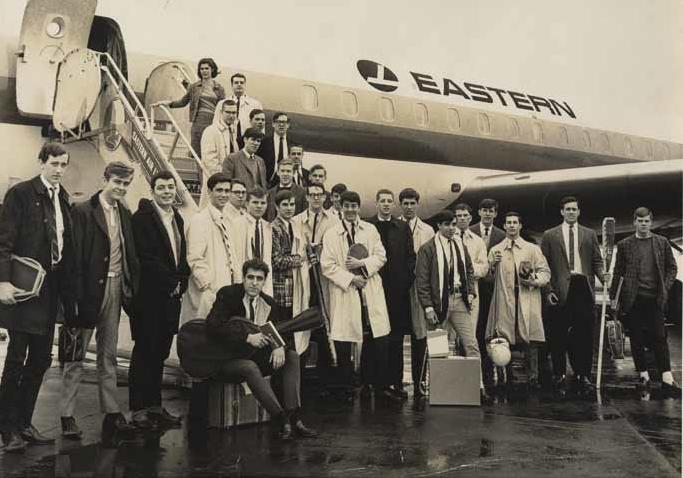



th E honor C od E
If a student is going to make a promise, then who better to be on the receiving end of that promise than a fellow student?
The Pingry community witnesses this oath every September during Convocation, when representatives from Middle and Upper School advisory groups hand the Student Body President and Honor Board Chair about 100 student-signed pledges to uphold the values of Pingry’s Honor Code—a ceremony that epitomizes the long-standing student ownership of the Code. In the following pages and in Class Notes, alumni, faculty members, current students, and administrators reflect on what the Honor Code means to them and how it has made a difference in their lives.
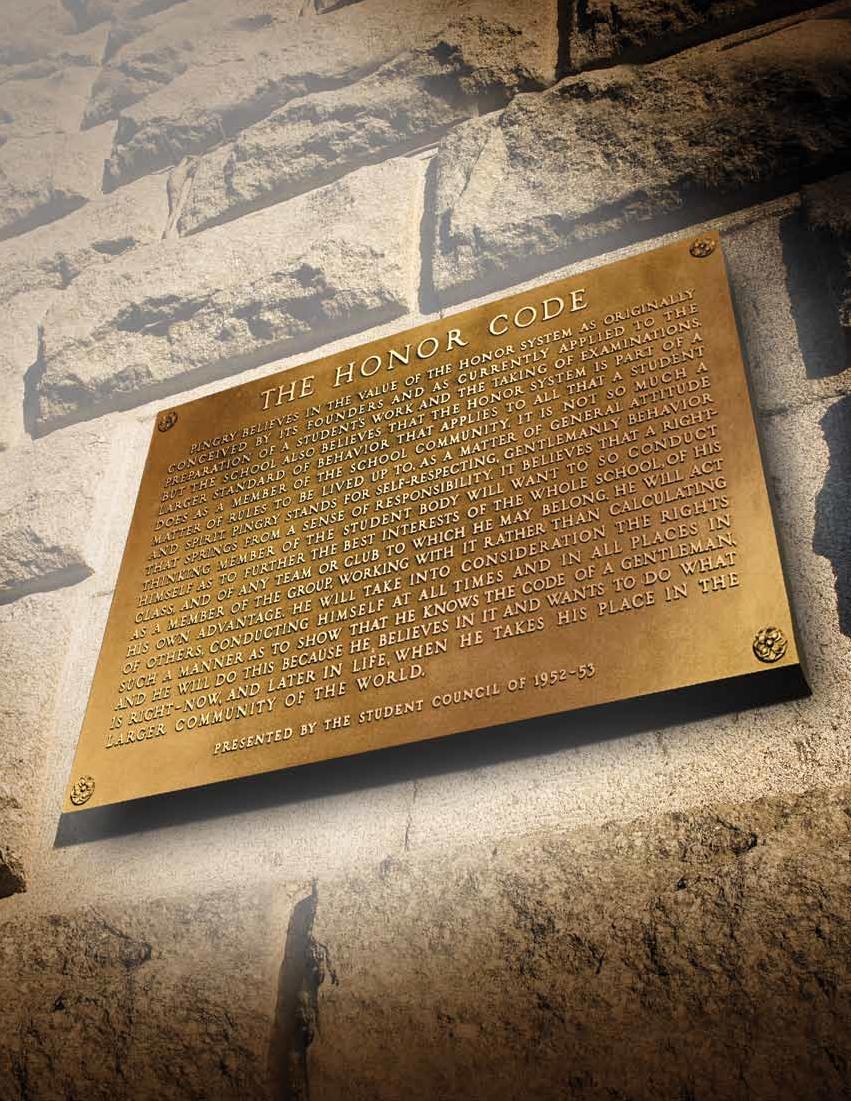
Eighty-five years have passed since the establishment of the student-owned Honor System and over 60 years since that system was expanded to include the Honor Code. These are notable milestones as Pingry celebrates its Sesquicentennial, an occasion that will highlight the Honor Code as the foundation of the school’s culture.
“I Do N ’ T Wor ry” OBSERVING
How does the school’s culture reflect honorable behavior, beyond the signing of pledges at the beginning of the school year? One visible example is that students, trusting each other, leave their backpacks, laptops, and musical instruments on top of lockers and in hallways during assemblies, lunch, conference periods, and free periods. Students return lost money, iPods, cell phones, and other valuables to the Middle and upper School offices; they are on their honor to pay a dollar for charitable Dress Down Days; and they are on their honor to pay for and make change in the cash bowl set aside for breakfast in the dining room.
In the Middle School, lockers do not have locks. “I once left my locker open, and my backpack was open. When I came back, nothing had moved. I don’t have to worry about students getting the answers for tests,” says Ellie Harrison ’17. Other Middle School students echo Ellie’s comments, saying they value the freedom, trust, and responsibility that result from the Honor Code. Edward Johnson ’17 likes the simplicity of the Code, as does Oliver Martin ’17, who proclaims, “It is not hard to do the right thing.”
“I know first-hand about students telling their teachers that too few points were deducted for mistakes on a test, even if that resulted in a lower grade. Teachers are free to give takehome tests, and they feel comfortable leaving the classroom during a test,” says upper School Director and mathematics teacher Denise BrownAllen P ’13. “In general, we trust our students will tell the truth and do the right thing.”
History teacher Mike Webster, proud to work at a school where the Honor Code has unified everyone for decades, echoes this sentiment. “We trust the students to get their work done on their own, without a lot of constant supervision, and we give them numerous chances to demonstrate that they’re responsible people,”
he says. In fact, he recalls a former student who, one day after submitting a research project, reported himself for violating the guidelines.
A passionate advocate of the Honor Code, Mr. Webster always reminds his students about respect and responsibility—respect for one’s self and classmates, and the responsibility for smooth interaction with the community so that people remember their school years as a time of fun and positive growth. “Having an Honor Code allows all students and teachers to work together and learn in a positive environment. As society makes people think more about ‘me, me, me,’ the Honor Code is really about ‘us, us, us,’” he says.
Trust is automatic for Spanish teacher Vic Nazario P ’90, ’94.

“Pingry students are like my own kids. I always try to be as fair as fair can be, but I also have ‘tough love,’ which they understand. I trust them completely, to the end of the world, unless they give me a reason not to,” he says. Having observed students helping each other when appropriate, but also having heard students tell classmates that they cannot help with homework, Mr. Nazario is convinced that the Honor Code will always be followed by students who are willing to do the right thing.
World Languages Department Chair and German teacher Norm LaValette P ’04 (who feels conditioned to trust the community), as well as Special Assistant to the Headmaster Miller Bugliari ’52, P ’86, ’90, ’97, GP ’20, underscore the fact that every Pingry student realizes, or comes to realize, the importance of living by an honorable code.
Lower School students are first exposed to the Code of Conduct before they abide by the Honor Code in the Middle and upper Schools. Rather than serving as the first of two value systems, the Code of Conduct was developed in 1994 to be an age-appropriate version of the Honor Code, with more specific actions and simpler language than the Honor Code so that young students would begin to understand the more complex principles that they would later embrace.
“Young children need a code that is written in language they can understand. Some of the concepts—when it is wrong to help a classmate, for example—are difficult for them to grasp at a young age. It is also helpful to have the Code of Conduct focus on the positive aspects of honorable behavior. Therefore, the Lower School Code of Conduct presents the ideals expressed in the Honor Code in a childfriendly ‘I will’ format. It gives specific examples of behavior and reminds children that they are responsible for their words and actions. They see the Code as a pledge they take to try their best to practice honorable behavior,” says Lower School Director Ted Corvino, Sr. P ’94, ’97, ’02.
B E yond Pingry
Probably the best tribute that can be paid to the Honor Code is trying to promote its values beyond Pingry. John Anderson ’57 learned so much from the Code that, following his years at Hamilton College and in the military (both of which also had Honor Codes), he introduced the idea of an Honor Code while attending the Tuck School of Business at Dartmouth College. ultimately, Tuck adopted an Honor Principle.
Dr. Tom Corbin ’58 was influenced to be forthright, as well as truthful. “There are many people who are basically truthful, yet will shade answers and opinions to tell others what they seem to want to hear, especially those for whom they work. Honesty should include being forthright,” he says.
Now a teacher and department chair at Morristown-Beard School, Dr. Larch Fidler ’69 learned from the Code to be optimistic and trusting, as well as responsible to the school itself and the other students. “As an educator, I trust my students. You are judged by and responsible to your peers,” he says.
Recalling an instance of rampant cheating during a final exam at New England College, Joshua Gradwohl ’80 still believes he did the right thing by reporting the entire class to the professor. “I told him about Pingry and the Honor Code and how upset I was at what had transpired during his final exam. To this day at work, whether I know I have done right or believe I may have made a mistake, if asked if I was responsible for an action, I tell the truth,” he says.
Pingry history teacher John Crowley-Delman ’97 thinks about his lessons in terms of ethical dilemmas—did historical figures make the right decisions, and how can we learn from those decisions? “If I had not attended Pingry, I don’t know if that’s how I would view history and be teaching history,” Mr. CrowleyDelman says. “Yet, I strongly believe it is the most valuable way to teach history.”
Different perspectives are important to Aimee Sostowski ’97, and, for her, the existence of the Honor Code created an academic environment that fostered critical thinking, debate, and opportunities for the exchange of different points of view. “Many of my fondest memories of Pingry involve occasions that challenged us to consider controversial ‘real world’ issues, because Pingry is not representative of the ‘real world.’ Some examples are the Freedom course [a senior elective covering ethics, philosophy, and current issues], guest speakers, a trip to the Whitney Museum of American Art, and the u.S. Government course. The school treated us as mature individuals, and I learned a lot about humanity inside and outside the classroom,” she says.
Editor’s Note: Read more from these and other alumni in Class Notes.



During Pingry’s long history, each headmaster played a role in modeling the Honor Code for the student body, but the passage of time has influenced students’ perceptions. When he began his tenure in 1987, Mr. Hanly faced the challenge of student apathy toward the Honor Code.
According to Director of Studies Lydia Geacintov P ’84, ’88, there were no formal discussions about the Code, and students felt that it was a formality that existed only on paper.
Even with its different name, Lower School students do understand that the Code of Conduct is based on the Honor Code, both because they see and hear the wording of the Honor Code and because the teachers incorporate the spirit of the Honor Code in the students’ daily lives. “In my homeroom, the students identify the Code of Conduct as the Honor Code because I always refer to it as the Honor Code,” says fifth-grade math teacher Bob Smith.
In the library, students apply the Code of Conduct in multiple ways— book discussions, library behavior, and caring for school property, to name a few examples. Librarian Ann D’Innocenzo asks questions about behavior, honesty, decisions, diversity, and character in both fiction and nonfiction works, even something as simple as Dr. Seuss. “While reading aloud The Sneeches, the students and I shared ideas about respect for differences and treating others the way you would want to be treated. I have found that the Code of Conduct is the perfect tool to really make these ideas meaningful to the students’ lives,” Mrs. D’Innocenzo says.
Tom Berdos, who teaches music at both the Short Hills and Martinsville Campuses, also refers to both Codes as a transition. “It’s helpful
for sixth-grade students who attended school at Short Hills to have the Code of Conduct and Honor Code as a bridge between campuses, because Short Hills and Martinsville are very different. The Codes unify the campuses and give the students a familiar culture,” he says.
“As society makes people think more about ‘me, me, me,’ the Honor Code is really about ‘us, us, us.’”
HiStory teacHer Mike WeBSter
According to Mr. Berdos, the infusion of new students in Grade 6 provides an opportunity to further instill the ideals of the Honor Code. While the fifth-grade students are the oldest students in the Lower School and, consequently, have lived with the Code of Conduct for the longest time, many of the new students in Grade 6 are not familiar with the Honor Code. The teachers need to make sure that the new students understand the Code—lessons that serve as continuing reminders about honorable behavior for the returning students.
Mr. Hanly felt that it was imperative to create a climate in which cheating or plagiarizing never enters students’ minds, the same as preventing bullying. “No debate or discussion would be necessary because it simply is not acceptable behavior,” he says.
For a year, beginning in 1993, he asked Mrs. Geacintov to chair a review of the Code—a process that included surveys of students, faculty members, and parents. His charge: examine the execution of the Honor Code, discuss if the school needed a uniform method to enforce it, and find out if people felt invested in an institution with an Honor Code. Also uncertain was the fate of the Academic Judicial Board (AJB), a committee that handled academic infractions separately from the discipline committee.
“After many meetings involving the student government, the student body, and a presentation to representatives from the PSPA (Pingry School Parents’ Association), the community decided overwhelmingly to keep the Honor Code, but review the AJB,” Mrs. Geacintov says.
Jennifer Lee ’96 and other students visited Haverford College to review their Honor Board system, resulting in the creation of Pingry’s Honor
Board in 1995 to hear both academic and disciplinary cases (see article on page 22); in contrast to students automatically being named to the AJB based on their position in student government, students must apply for the Honor Board. In addition, to reinforce the magnitude of the Honor Code, Mr. Hanly spoke weekly about common ethical dilemmas, and he remembers an event that made an impression on him.
After one assembly in which he spoke about how we treat others, a seventhgrade boy reacted so strongly to Mr. Hanly’s speech that he apologized to a group of his classmates whom he had bullied and treated harshly.
“Were it not for Mr. Hanly and his desire to revive the Honor Code and involve and empower students in that process, we would not have a strong Honor Code and Honor Board today,” Mrs. Geacintov says.
“C H oo SIN g TH e Ho N or Co D e AS A F AMI ly”
By 2005, when Headmaster Nat Conard P ’09, ’11 joined Pingry, the Board of Trustees felt that the Honor Code needed to be reinvigorated again because of widespread cynicism among students, many of whom viewed the Code as nothing more than administrative and as a rule book to be followed. Mr. Conard was charged with bringing the Code back to life.
“I started talking about the Honor Code in my speeches and worked with [former Dean of Student Life] Joan Hearst and [Middle School Dean of Students] Kooheli Chatterji ’93 to build consistency into the discipline system. I also emphasize the Honor Code with parents at admission events—if their family chooses Pingry, they are choosing the Honor Code as a family,” he says.
It is surprising that one thing, the Honor Code, connects you to the thousand-plus students at Pingry. It is like you have one thing in common with every person who attends this school—even the ones you haven’t made eye contact with. Those connections make me feel safe. It’s as if I am surrounded by a wall of people who are all connected to each other, and who are all connected to me.
atHena GeraSouliS ’17
During the admission process, prospective students and parents must answer a question about the Honor Code. “The Honor Code question on our admission application impresses families because they are asked to consider the Honor Code before joining our community. This stresses the importance of the Code at Pingry and immediately establishes the value of the Honor Code. Many schools have Honor Codes, but the fact that ours includes academic and social components intrigues prospective families.
Parents and students want to understand how the Code functions, which allows for engaging dialogue throughout the admission process. The social component ensures that even though you may not like everyone in school, you will absolutely respect everyone, which helps families trust our community,” says Director of Admission and Enrollment Allie (Manly) Brunhouse ’00.
What about the other application, for colleges? How does Pingry approach The Common Application’s question about dishonorable behavior?
“Colleges realize that students make and learn from their mistakes, so
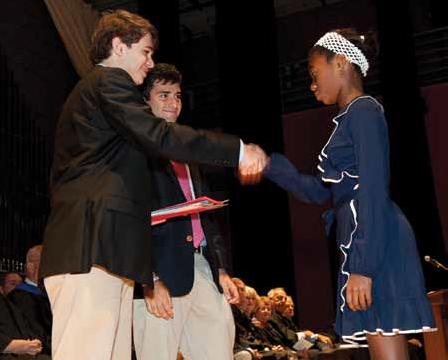
we’re doing the right thing [by encouraging our students to be honest]. The colleges encouraged us to move in that direction, and they assured us that they will consider a student’s entire Pingry experience and not evaluate them based on one transgression,” says Director of College Counseling Tim Lear ’92. Colleges have been true to their word—Pingry students who have disclosed violations have been accepted at Ivy League and other highlyselective schools, and some have been nominated for and won academic scholarships.
“The social component ensures that even though you may not like everyone in school, you will absolutely respect everyone, which helps families trust our community.”
director
of adMiSSion
and
enrollMent
allie (Manly) BrunHouSe ’00
Another revealing question: how do colleges perceive Pingry’s Honor Code and its overall impact on Pingry students? Amy R. Smith, Associate Director of undergraduate Admissions at Vanderbilt university, provides one perspective. “Since Vanderbilt has an Honor Code—which all students sign in a formal ceremony at the beginning of their first year—we appreciate high schools that also have Honor Codes. We find that students who attend high schools with an Honor Code are often a good fit for Vanderbilt as they already understand the concept,” she says.
Hamilton College, where 18 Pingry graduates will be studying during the 2011-12 academic year, has tremendous respect for Pingry’s Honor Code. “Hamilton students who come from Pingry are amazing students and members of the Hamilton community, and it is because of the values instilled while at Pingry and through the presence of an Honor Code at Pingry. We have tremendous respect for the Pingry community, and we value the administration’s and students’ commitment to uphold the integrity of the Honor Code at Pingry,” says Associate Dean of Admission/
in th E ir word S
Fourth- and fifth-grade students, who joined Student Council to help improve Pingry, share their thoughts about the Honor Code and acting as role models for their classmates.
“The Honor Code offers guidelines for the school, or else there might be chaos when students face difficult choices.”
Matt keller ’19
“I make the right decisions inside and outside school, and I teach my friends to be better people. The great thing about the Honor Code is that Pingry students set examples for others. As a member of Student Council, I listen to the students and try to figure out how the school could improve in their minds.”
clyde leef ’18
“By following the Honor Code, the Pingry community is better and safer. By joining the Student Council, I might be able to make a difference in someone’s life. My classmates could make better decisions based on what the Student Council says.”
nate levinzon ’19
“Everyone should know life’s basic principles— like treating people well and doing the right thing— and act the same whether or not other people are watching. I joined Student Council because, if you want something to be done, you should take the initiative to do it yourself. I also wanted to find out if my classmates would vote for me based on what I stand for. When playing on teams outside Pingry, I take a leadership role and set an example for my teammates, which fosters mutual respect and honesty.”
MicHael
WeBer ’18
Director of Alumni Recruitment
Initiatives Sara (Rizzo) Ziesenitz (Hamilton ’00).
Other colleges who are serious about honor and respect also value the fact that Pingry has an Honor Code, and some colleges say they are careful not to disadvantage other students who do not attend high schools with Honor Codes.
“p
A sense of honor is vital to Katie Laud P ’07, ’10, ’12, who served on the Judiciary Committee at Dartmouth College’s Tuck School of Business (in a notable Pingry connection, John Anderson ’57, while serving as Student Government President at Tuck, played a pivotal role in establishing the school’s Honor Principle. He grew up believing that acting honorably “is the way things should be,” which Pingry reinforced —read more on page 15).
Mrs. Laud, who graduated from Tuck in 1985, recalls an intense investigation that year into a significant violation involving an open book exam—the violated rule was “understood by the community,” in Mrs. Laud’s words, but not explicitly written anywhere. “ultimately, the community felt there was a violation, and the sense of ‘right and wrong’ trumped the explicit rules. That’s important because [it showed] what the community will or will not tolerate,” she says.
Mrs. Laud feels that the Honor Code is especially important in a high-pressure environment. “Pingry students would probably look for ways to get ahead if they didn’t have guidance,” she says.
Providing one family’s perspective about whether values are taught at home and reinforced at school, or
taught at school and reinforced at home, Henry Johnson P ’15, ’17, ’21 says that he and his wife Susan aspire for their sons to be “gentlemen” and chose Pingry in no small part because of the Honor Code. “Our family is committed to integrity, respect, and putting others first,” he says. “Pingry is on our side as parents, and the Honor Code reflects our priorities as we raise our sons.”
Mr. Johnson further explains that volunteerism is important to their family and that they have worked to instill the importance of community engagement in their sons. Most importantly, he is adamant about character development. “We tell the boys all the time never to measure people’s success by their job title or how wealthy they are, but by their impact on the world around them. We try to get them to focus on who they are as people and how they can improve the fabric of the various communities in which they are involved,” he says.
Rutgers university Professor Don McCabe, founder of the Center for Academic Integrity, is keenly interested in data about academic honesty in schools. With his assistance, Pingry’s Honor Board administered his student survey to the entire upper School in the fall of 2009. Questions covered the frequency of cheating on tests and quizzes, among other topics, and students were asked if they would vote to keep or remove the Honor Code. On the subject of cheating, the numbers for all four grades (each of which has about 130 students) were exceedingly low—the percentage in each grade who said they often cheated was in the single digits. As for the Honor Code, 90 percent would vote to keep it.
Due to the fact that surveys of cheating rates at high schools are not as frequent as surveys of cheating rates at colleges and universities, a few numbers illustrate that Pingry students rate significantly higher in adherence to the Code compared with students across the country.
• The Center for Academic Integrity reported that, in 1990, 1995, and 1999, surveys of over 12,000 students on 48 campuses indicate that test cheating on campuses with Honor Codes was about one-third to one-half lower than the level on campuses without Honor Codes.
• A Rutgers survey of 12,000 students between 1990 and 2000 found that 47 percent of students at non-Honor Code schools admitted to cheating, while fewer than 25 percent of students at Honor Code schools admitted to it.
Pingry’s numbers are even lower than other Honor Code schools’, demonstrating that, despite the academic pressures facing Pingry students, cheating is less prevalent here than on other campuses even with Honor Codes. These results prove that Pingry’s Honor Code and culture are remarkably effective in fostering honorable behavior.
There is also the larger issue of placing honor in perspective beyond the education system. What happens when students begin their careers? Pingry students have heard from guest speakers time and time again that only with honor and integrity can they enjoy truly successful careers because they will maintain their colleagues’ and potential clients’ trust. In the words of Juliette Jordan ’06, “Pingry’s Honor Code holds students to the highest standards so they can start internalizing its true values. In college, future jobs, and life in general, you are better off if you live by solid morals because you are bound to be faced with difficult situations.”
Pingry believes that students should understand and live by standards of honorable behavior, which are essentially a matter of attitude and spirit rather than a system of rules and regulations. Decent, self-respecting behavior must be based on personal integrity and genuine concern for others and on the ethical principles which are the basis of civilized society.
The members of the Pingry community should conduct themselves in a trustworthy manner that will further the best interests of the school, their class, and any teams or clubs to which they belong. They should act as responsible members of the community, working for the common good rather than solely for personal advantage. They should honor the rights of others, conducting themselves at all times in a moral and decent manner while at Pingry and throughout their lives as citizens of and contributors to the larger community of the world.
As an outgrowth of Mr. Conard’s initiatives, a number of new traditions were implemented at both the Short Hills and Martinsville Campuses. As of September 2007, the Lower School Student Council, advised by Grade 5 Social Studies teacher Cathy Everett, has been presenting the annual Honor Code assembly. Students in Kindergarten through Grade 5 listen to eight student representatives from Grades 4 and 5 who speak about different sections of the Code of Conduct and how those ideas apply to daily life. Following a short speech by Lower School Director Ted Corvino, Sr., representatives from each of the 17 homerooms present him with individually-signed copies of the Code of Conduct.
“The idea for this assembly was generated through the Student Council to make the entire Lower School, especially the youngest children in Kindergarten, aware of the importance of the Honor Code and that it is unique to Pingry,” Mrs. Everett says.
Since that same month in 2007, Convocation at the Martinsville Campus has had its own ceremony devoted to the Honor Code. That year’s Student Body President, Jessica Westerman ’08, had attended a public middle school where the faculty’s distrust of student morality inside and outside the classroom necessitated an exhaustive, often arbitrary, set of rules that severely limited student freedoms. As a maturing student and young adult, she found the short leash frustrating. “Pingry’s Honor Code restores that broken trust and fosters mutual respect between students and teachers,” Ms. Westerman says. “These freedoms undeniably make us feel more ‘adult,’ and that makes us feel better. My experience at Pingry under the Code was the beginning of my mature life.”
Spurred by her deep appreciation for Pingry’s Honor Code, Ms. Westerman worked with administrators to develop a ceremony during which students would deliver their signed pledges to uphold the Honor Code to the Student Body President and Honor Board Chair at Convocation. “The idea was to imbue our written promises with a more visible meaning,” she says.
“Signing the Code alongside fellow classmates in a more formal, observant setting serves as both an affirmation of its core principles and a reminder of why we sign it—for each other.”
Advancing the purpose of the Convocation ceremony, all faculty and staff at the Martinsville Campus have also been signing the Honor Code each year since the fall of 2007. “Student ownership of and engagement in the Honor Code are paramount, but the faculty and staff are demonstrating that they join the students in upholding the Code’s values. Their affirmation hangs next to the Honor Code plaque in the school’s main entrance [explained by Phil Scrudato ’53 in Class Notes], connecting the past and present,” says Assistant Headmaster Jon Leef P ’15, ’18.
That connection is, perhaps, the best indication to anyone who enters the Martinsville Campus that, although the Honor System and Honor Code were born in different eras, they remain central to Pingry’s philosophy of developing students’ honorable behavior and their service to the Pingry community and the larger community of the world.
“It placed more trust and faith in students ranging from ages 13 to 18 than most parents would [place] in their children of those ages,” says former Honor Board Chair Ishita Bali ’07. Established over 15 years ago, the Honor Board gives the student body a direct voice in the application, interpretation, and enforcement of the Honor Code. The group, comprised of students and faculty members, meets at least once each month to discuss how they can promote the Honor Code and make sure the students think about the scope and presence of the Honor Code during the year, not only when they sign their pledges in September.
Perhaps the activity that most people at Pingry associate with the Honor
“Without their commitment to these ideals, the Honor Code would not work as well as it does.”
uPPer ScHool dean of Student life, Honor Board adviSor, and enGliSH teacHer ridie MarkenSon
Board is representing the student body at disciplinary hearings. These cases involve violations or possible violations of the Honor Code—the facts are not always clear.
“The students must be consistent, fair, and unbiased in their application of the Code, and they must be
conscious of the precedents they are setting. They also must maintain confidentiality at all times. It is a challenging job—one the students take very seriously. Without their commitment to these ideals, the Honor Code would not work as well as it does,” says upper School Dean of Student Life, Honor Board Advisor, and English teacher Ridie Markenson. If the Honor Board determines that a violation has been committed, it recommends consequences to the headmaster.
According to former Honor Board Chair and Pingry lifer Juliette Jordan ’06, daughter of French teacher Kelly Jordan P ’04, ’06, “consequences” was an important word, instead of “punishment,” to make students
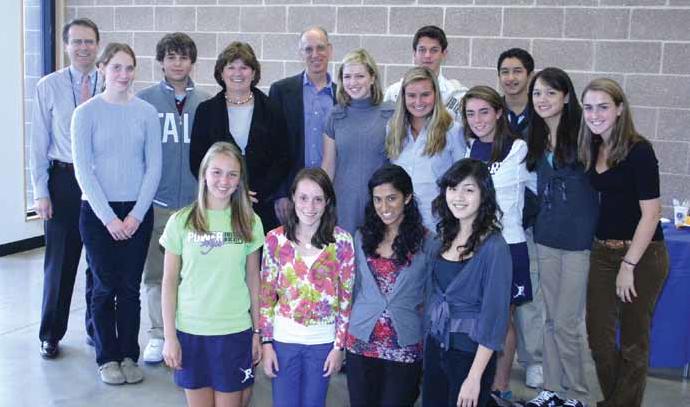
think about the results of and lessons learned from their actions. “I liked the idea of the students owning the process and holding their peers to higher standards,” Ms. Jordan says.
Pingry has always accentuated the fact that the Honor Code comprises principles and guidelines, rather than a list of rules. Serving as Chair of the Honor Board helped Sonam Sharma ’04 understand and appreciate that distinction. “Each case was considered individually, with each gray area being considered and deliberated at length. Having students from each grade and multiple faculty members serve on the Board brought many unique perspectives to each case. I realized how important it is to view situations from all angles and how valuable it was to have students offering their opinions and interpretations of the Honor Code,” she says.
As a four-year member of the Honor Board at Hamilton College (the Board’s sole focus is academic dishonesty), including serving as Chair her senior year, Pingry’s Director of Admission and Enrollment Allie (Manly) Brunhouse ’00 observed a major difference in the reactions of Hamilton students. “It was great to participate in [Hamilton’s] system and, in some cases, help students realize that an Honor Code isn’t bad—it’s intended to help a community. Many times, there was little remorse for a bad choice, just remorse for the punishment. At Pingry, we use the Honor Code to help a student understand how he or she could make a better choice in the future. The punishment is a learning tool—not punishment for the sake of punishment,” she says.
Aside from hearing cases, the Pingry Honor Board takes an annual field trip (such as visiting a courthouse or attending Honor Code conferences) and focuses on a major project during the school year; last year’s (200910) project was a survey for students about the Honor Code—the results
Not everyone is sent out into the world with a firm belief in ethical behavior and an awareness of their personal conduct. That is a lesson I learned at home, but it was reinforced by this institution. I’m glad that, even if there is no Honor Code at my future college or workplace, maintaining respectful and moral behavior will always be one of my underlying values.
colleen roBertS ’11 PreSident, claSS of 2011
indicate that 90 percent of the student body would vote to keep the Honor Code—while this year’s (2010-11) was writing new content for an upcoming expansion of the Honor Board’s presence on Pingry’s web site.
Two other Honor Board initiatives are the Honor Board Assembly Series and Faculty Speaker Series. The Honor Board Assembly Series has featured, among others, Randy Cohen, former author of “The Ethicist” column for The New York Times Magazine ; and a discussion with former Headmaster John Hanly, former President of Morgan Stanley Steve Newhouse ’65, P ’95, ’97, ’99, and former Honor Board Chair Orianne Dutka ’98 (in the past, there has been some overlap between speakers for the Honor Board and for the John Hanly Lecture Series—for example, Mr. Hanly and Mr. Newhouse spoke for both). In the faculty series, which was created to foster students’ continuing dialogue about the Honor
Code, a faculty member speaks about a topic of his or her choosing during Morning Meeting.
Each member of the Honor Board is appointed for two years based on an application that includes essays about the Honor Code and recommendations from classmates and faculty members. Kathryn Kolb ’11, who was named Honor Board Chair for the 2010-11 academic year, shares her perspective about the Honor Board’s other, more informal, role. “Honor Board members [give] gentle reminders. For instance, sometimes students will start talking during a test— not necessarily giving any aid or answers—and I’ll remind them that it’s inappropriate. I think that most students completely agree with me and respect my opinion,” she says.
Like serving as Student Body President or captain of a sports team, students mature while serving as Honor Board Chair. Ms. Bali—who did not have significant experience with confrontation or being an authority figure prior to serving as Chair—sought to challenge herself, along with other goals. “I wanted to ensure that students were wellrepresented at all times and that the students were aware that the Honor Board, especially its student members, existed as an extension of them,” she says.
Former Honor Board Chair Jonathan Jacobs ’01, now an attorney, says that serving on the board taught him a great deal about personal responsibility and evaluating his classmates’ actions. “The Honor Board was also an introduction to basic legal functions, such as the examination of evidence, taking of testimony, and importance of the letter of the law. These skills have served me immeasurably in my practice,” he says.
Read more of Mr. Jacobs’ thoughts about the Honor Code in Class Notes, and read Ms. Kolb’s in-depth essay about the Honor Board in “Dictum Ultimum” on page 64.
“ y ou’r E g oin g th E w ron g wA y”
Sportsmanship has always been of the utmost importance to Pingry’s athletics program. Mike Webster, head coach of the boys’ varsity lacrosse team, encourages honorable behavior because good sportsmanship simply makes sense. “You won’t receive a penalty, which hurts the team, and you won’t be focusing on what happened in the past, like payback against an opponent. We want players to focus on what is happening now and in the future,” he says.
Similarly, Middle School Softball Coach Laura Mila describes honor on the fields as acting with poise.
“Sportsmanship teaches you to be the ‘bigger person’ in situations when it is easier to stoop to someone else’s level. If you keep your composure and treat your opponent with respect, you can transfer those skills to other areas in life,” she says.
“I expect our team to play hard and play by the rules,” says Miller Bugliari ’52, P ’86, ’90, ’97, GP ’20, head coach of the boys’ varsity soccer team. “If you don’t do either one, you’re not being fair to yourself, and you’re not being fair to your teammates, your opponents, or the game. We don’t tolerate bad decorum. Proper behavior is always the rule.”
Bill Reichle P ’00 and Judy Lee, head coaches of the boys’ and girls’ varsity swimming teams, respectively, ask the Pingry swimmers to stay in their lanes after every race and not leave the pool until all of the swimmers have finished. Middle School Assistant Swimming Coach Lisa Ancona does the same. “Staying in the pool lets your competitors know that you recognize their efforts to be just as worthwhile as your own,” she says.
Also an assistant coach for varsity water polo, Ms. Ancona believes in the long-term benefits of
Demonstrating sportsmanship and fair play are critical attributes for all Pingry athletes to master. The value of sportsmanship endures beyond the fields and competitions— it serves as a blueprint for an honorable life.
director of atHleticS Gerry vanaSSe P ’14, ’20
sportsmanship. “While winning a competition is a favorable outcome, the development of qualities like integrity and compassion will prove far more beneficial to our athletes in 10 years than the fact that their team had a winning record in high school,” she says.
Mrs. Lee’s varsity field hockey players thank the officials and perform a cheer to congratulate the other team’s efforts. “We are respectful of the other team’s efforts during the game if the score is lopsided. Two years ago,
we won our game against another team by a significant margin. When we played them again later in the season, we adjusted our lineup and the score was 2-0. We received a nice note from their Athletic Director, thanking us for respecting their efforts and creating a more competitive situation,” she says.
Varsity Football Assistant Coach Jon Leef P ’15, ’18 expects the players to play hard regardless of whether they are winning or losing. “People who come to watch the game for even a few minutes shouldn’t be able to tell if you’re winning or losing,” he says. Reflecting on recent events in professional sports, Mr. Leef is convinced that coaches have to talk about sportsmanship, especially because it is not reinforced by popular culture. Squash players are expected to enforce the rules on their own and to act as referees when they are not playing. “They have to learn how to make difficult calls, as often as not in favor of the opposing team. In fact, in order for players to maintain a national ranking, they must pass a written refereeing exam,” says Head Coach Ramsay Vehslage. “I have always been very proud of my players’ sportsmanship.”
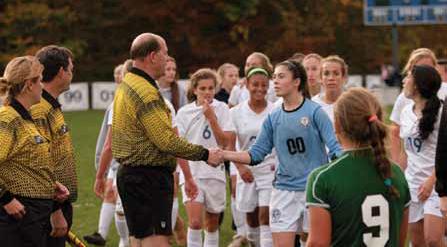
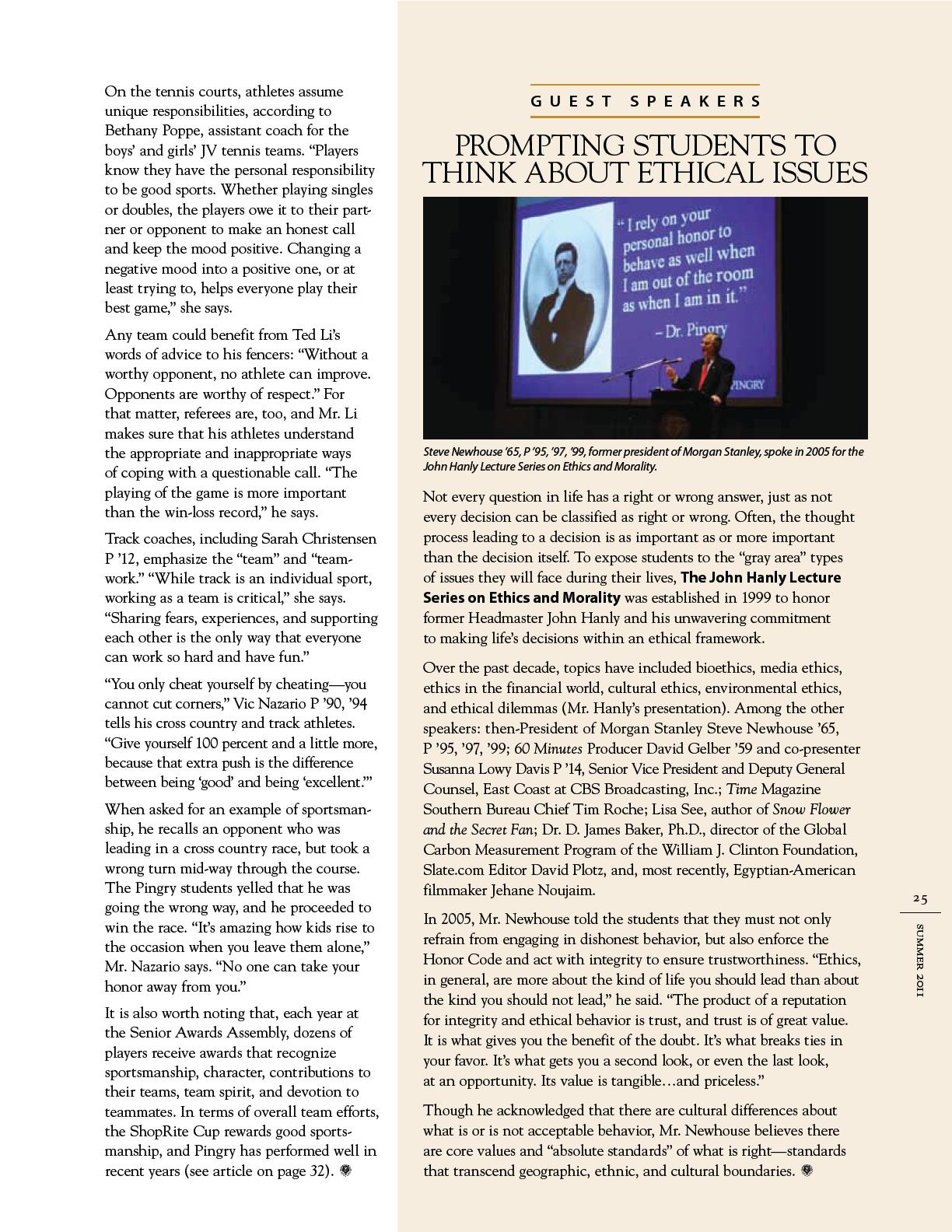
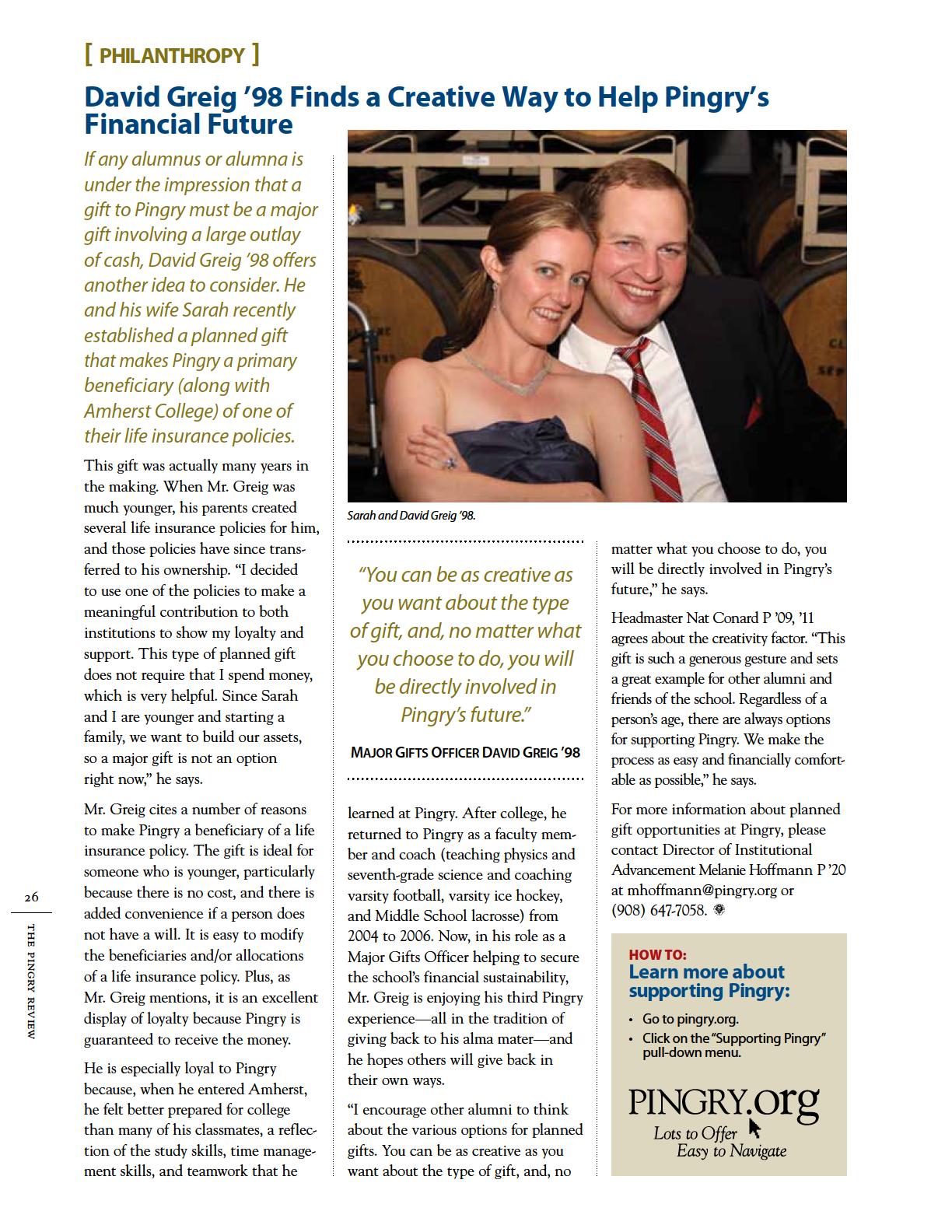
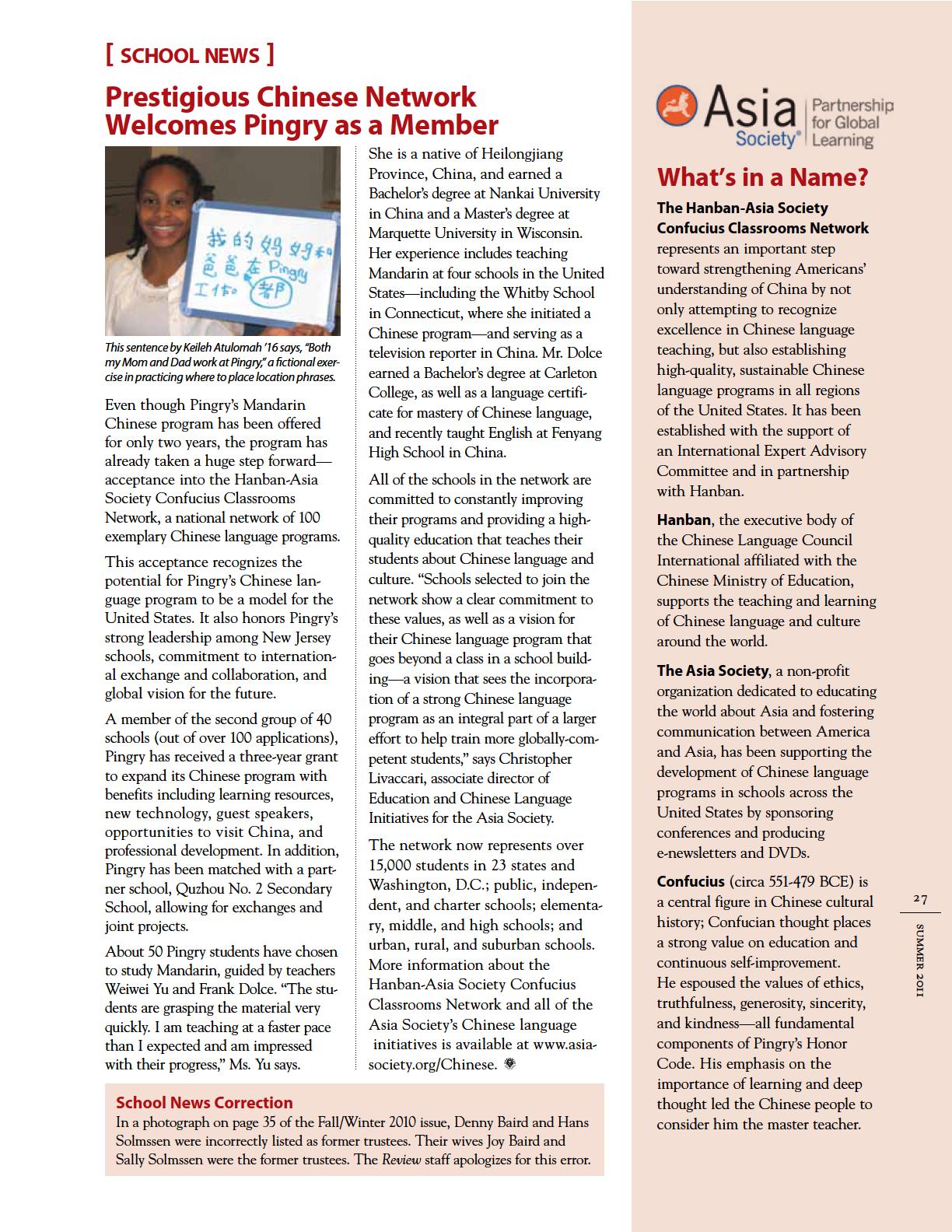
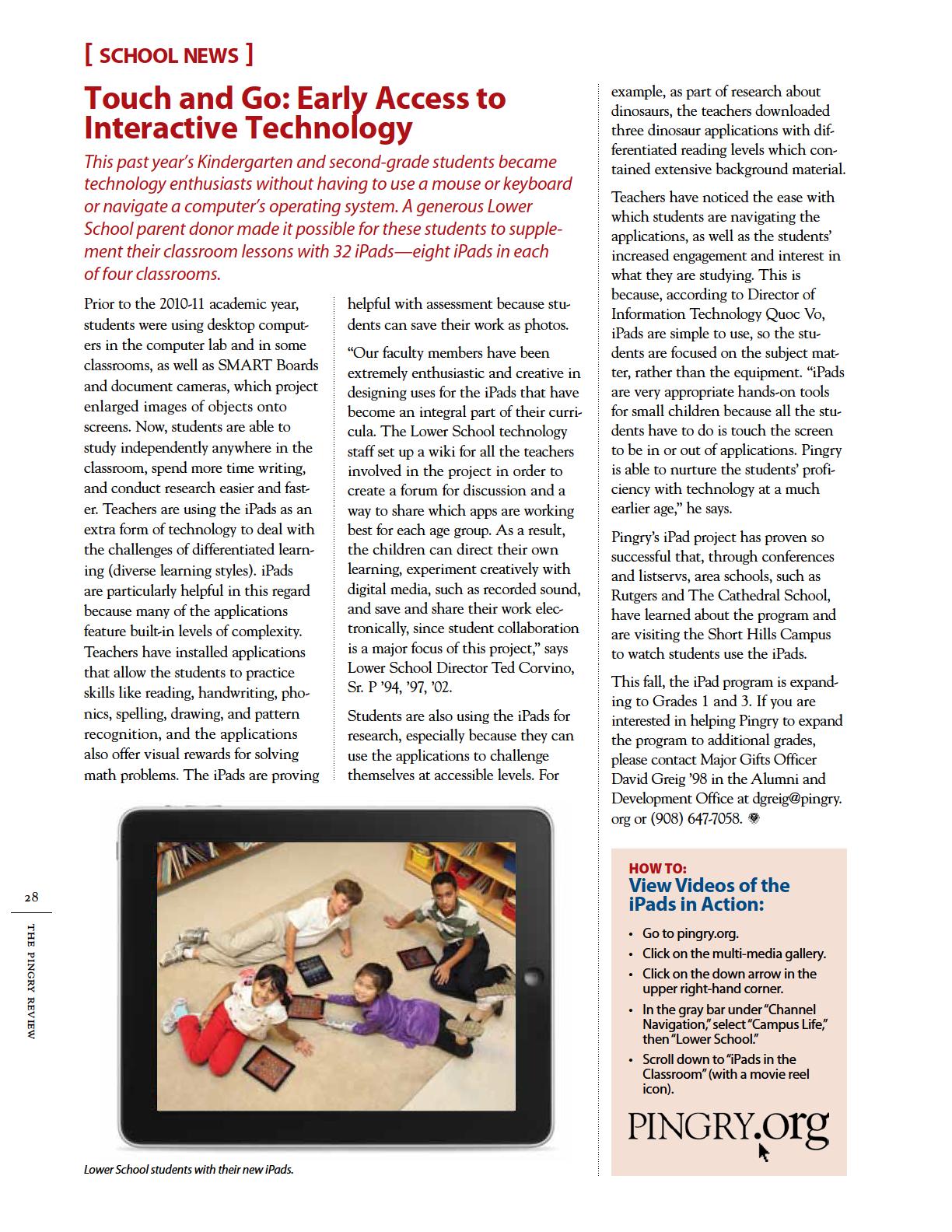
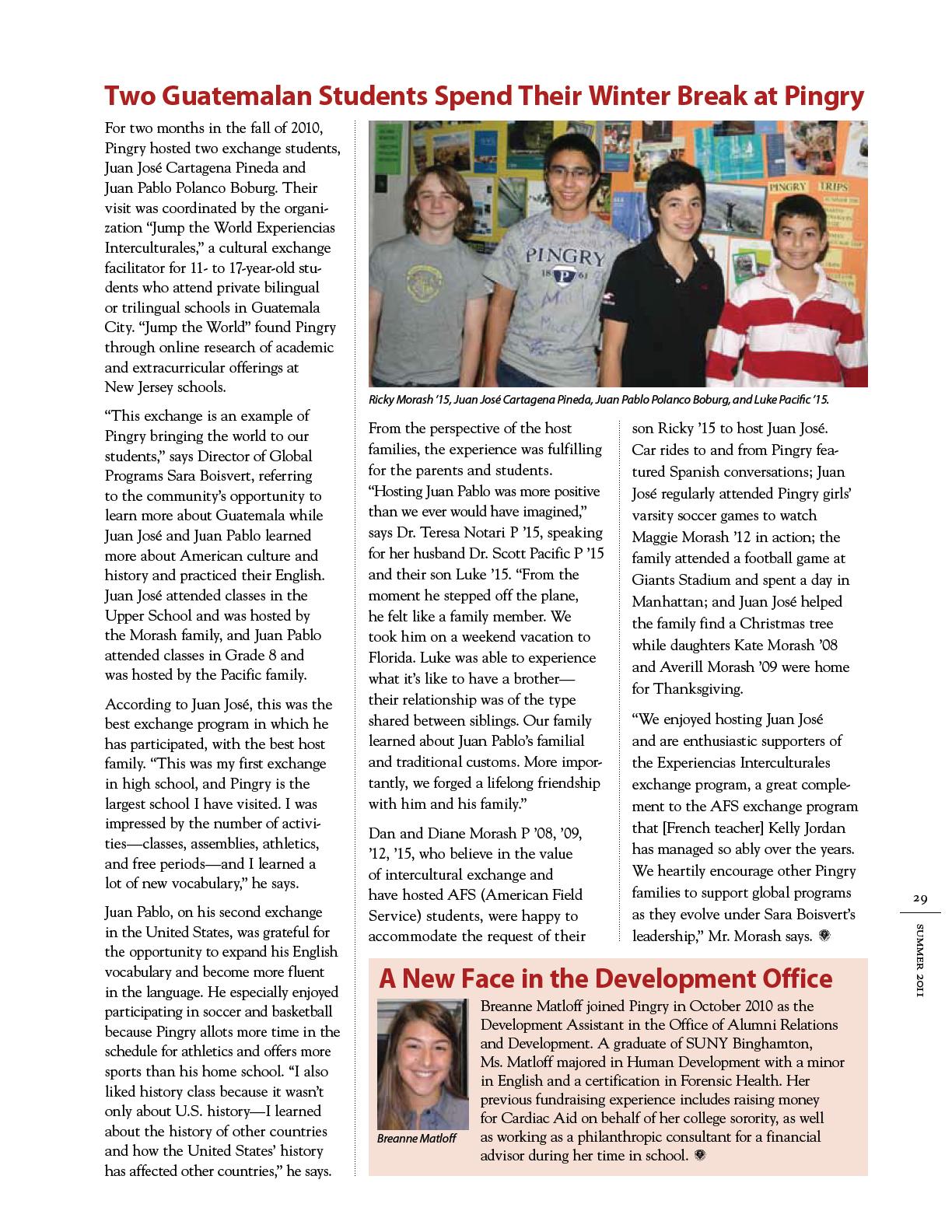
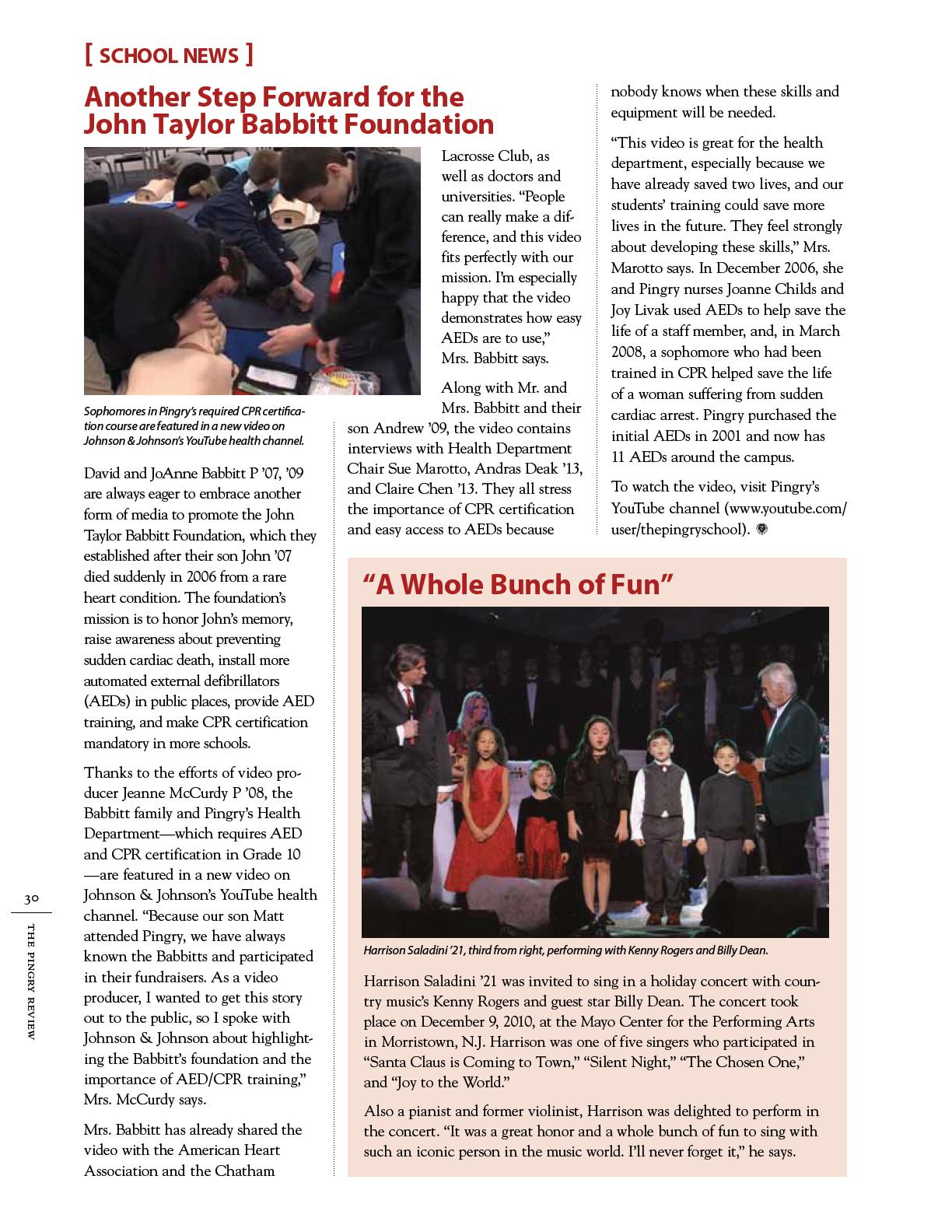
Nic Fink ’11 earned so many honors in the Pingry pool that his upcoming trip in the summer of 2012 reflects his exceptional abilities to constantly strive for and achieve new milestones. He will travel to the Qwest Center in Omaha, Nebraska—having qualified for two events at the 2012 united States Olympic Swimming Trials. These trials will select the united States Olympic swimming team that will compete in London for the Games of the XXX Olympiad. Nic qualified for the Olympic Trials as a result of his performances at uSA Swimming’s 2010 Speedo Junior National Championships in Irvine, California. In that August meet, he swam personal best times in the 100-meter breaststroke (1:03.91) and 200-meter breaststroke (2:19.10). Both finishes were faster than the Olympic Trials qualifying times of 1:04.69 and 2:20.79, respectively. “It was always my goal to meet the time standards for the Olympic Trials, so qualifying for the Trials means a lot to me. It is an honor that I can represent my Pingry team,” he says.
A four-year member of Pingry’s Boys’ Varsity Swimming Team under Head Coach Bill Reichle P ’00, the six-footthree 170-pound Fink trains in the summer and winter as a member of the uSA Swimming club team Cougar Aquatic in Montclair, New Jersey. Amazingly, for the first three years of high school, he was not a year-round swimmer—cross country and tennis were on his schedule in the fall and spring. He decided to focus on swimming for his senior year. The sport runs in his family; Nic’s sister Regan Fink ’10 swims at Kenyon College. In the fall of 2011, Nic will head to the university of Georgia and join the Men’s Swimming & Diving Team.
From Coach Reichle’s perspective, Nic is a natural swimmer who puts his teammates first. “Nic is just getting
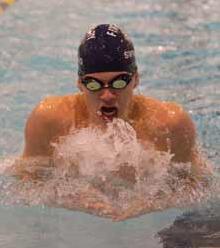
started and has a promising swim career ahead of him. Since freshman year, he has developed into a very accomplished swimmer,” he says.
According to teammate James Ross ’12, Nic’s success stems from his ability to remain calm and his strong desire to reach higher levels of achievement. For example, during the 2009-10 season, Nic told Coach Reichle that he was pursuing the record in the 200 freestyle at the Big Blue Invitational and then shattered it by more than a second. He also broke the record for the 100 freestyle by almost half a second and, in February 2010, set the national record in the 100-meter breaststroke of 1:03.37 (in January 2011, he set a new national record in the latter, 1:02.63). “These records demonstrate that he has incredibly clear thinking, enabling him to achieve the goals he sets for himself. He gets excited about racing and brings us along with him,” James says.
Pingry has also played a major role in Nic’s success. “The school has taught me to work hard and manage my time well, so I can maximize my academics and my athletics. Year after year, I’ve been able to improve. My ultimate career goal is to make the Olympics, whether in 2012 or 2016, and, even though the odds are against me, I will always work toward meeting my goal,” he says.
Nic Fink’s Résumé of Records and Accolades
• 11-time All-American.
200-yard freestyle relay (2009, 2010, 2011).
200-yard medley relay (2010, 2011).
400-yard freestyle relay (2010, 2011).
200-yard individual medley (2011).
50-yard freestyle relay (2011).
100-yard breaststroke (2010, 2011).
• USA Swimming Scholastic All-American (2010, 2011).
• Fastest 100-yard breaststroke swimmer in New Jersey’s history.
• 9 Meet of Champions titles.
• Won four gold medals at the NJSIAA Meet of Champions (2011) and broke his previous record in the 100-yard breaststroke.
• 4-time Prep Breaststroke Winner.
• 4-time County Breaststroke Winner.
• “New Jersey State Swimmer of the Year” (2010, 2011).
• Courier News “Boys Swimmer of the Year” (2010, 2011).
• Was undefeated in every event he swam during the 2010-11 season.
Helped lead Pingry to the swimming team’s…
• four titles at the NJSIAA Meet of Champions (2011). Pingry set new records in all four events.
• second consecutive sweep of all three relays at the NJSIAA Meet of Champions (2010-2011). Only one other team has accomplished that feat in the meet’s 89-year history. Pingry is also the first boys team to break the meet record in all three relays in the same year.
• fourth consecutive NJSIAA Non-Public B State Championship (2008-2011).
• second consecutive Prep State Division A title (2010, 2011).
• first Somerset County title in 15 years (2010).
• Skyland Conference title (2010).
In 2011, set two national independent school records
• 200-meter individual medley (2:05.27).
• 100-meter breaststroke (1:02.63).
Mike Webster, head coach of the Boys’ Varsity Lacrosse Team since 1989 and a member of the New Jersey Scholastic Coaches Association’s (NJSCA) Hall of Fame since 2007, has also been inducted into the New Jersey Lacrosse Hall of Fame.
“This is an incredible honor and one that reflects not only on me, but also on the quality, enthusiasm, and effort of my past and present assistant coaches and the hundreds of past and present Pingry lacrosse players whom I have coached,” he says.
Coach Webster entered his 23rd season in 2011 with a career record of 221-164. His teams have been Waterman Division Champions (twice); State Prep-A Champions in 1993, and Non-Public Group B State Champions in 2006. His “Coach of the Year” honors include the New Jersey Interscholastic Lacrosse
Coaches Association (twice), the National Federation Coaches Association, the Daily Record, the Courier News (twice), and The Star-Ledger He has also received both the Len Roland Sportsmanship Award (three times) and the Service Dedication and Promotion Award from the New Jersey Interscholastic Lacrosse Officials Association.

He won two NCAA Division I national championships while playing lacrosse at Johns Hopkins university, and later played professionally with the New Jersey Arrows.
“Coach Webster’s newest induction is a tribute to his continued dedication
and commitment to his athletes and to the sport of lacrosse. Pingry and the state of New Jersey are fortunate to have his dedication to the promotion and visibility of boys’ lacrosse. He is a passionate and caring coach, and the Athletics Department is proud of his achievements over the years,” says Director of Athletics Gerry Vanasse P ’14, ’20.
For three consecutive years, Pingry has been the most successful co-educational, non-public school in New Jersey in the ShopRite Cup—cosponsored by ShopRite and the New Jersey State Interscholastic Athletic Association (NJSIAA) since 2003.
The ShopRite Cup recognizes the competitive strengths of the state’s high school athletics programs by ranking schools’ successes in state tournaments and rewarding excellent sportsmanship. There are about 430 member schools in the competition, each of which is classified into one of six groups; Pingry is in Non-Public Group A (some schools play in Group A in some sports but in Group B in other sports, depending on the number of schools in a particular tournament).
In the ShopRite Cup, points are awarded based on advancement in state tournaments each season; schools accumulate points based on whether they finish first, second, third, or fourth in group champion-
ships in 32 sports. Single-gender schools earn double points. In addition, a school earns three bonus points when all of its teams are violation-free for an entire season.
Director of Athletics Gerry Vanasse P ’14, ’20 is committed to earning the bonus points because they reward sportsmanship and can make a big difference in the point totals. “Being violation-free is number one on my list of goals every year because a high level of sportsmanship mirrors Pingry’s Honor Code,” he says. The athletic teams achieved this goal during the 2010-11 academic year.
Considering the point structure, one can compare Pingry’s point totals with schools of different sizes in the other five groups. For example, in 2011, Pingry was ranked fifth in Group A with 89 points, which would have been good for the sixth-highest point total of all 430 member schools. In 2010, Pingry tied for fifth (76 points) and would have finished seventh in the
state. In 2009, Pingry was ranked fourth (87 points) and would have finished fifth in the state. In 2007, Pingry was ranked third (98 points) and would have finished fourth in the state.
With multiple teams advancing in state tournament play each year, Pingry has one of the most successful athletics programs in the state. To help maintain this momentum, Mr. Vanasse stresses the importance of sportsmanship with coaches and team captains.
“Captains assist coaches in fostering sportsmanship with their teammates before and during games. I also hold independent meetings with captains and impress upon the coaches the importance of emphasizing sportsmanship with their players,” he says. “The ShopRite Cup and the value it places on sportsmanship indicate to our athletes that sportsmanship is held in the highest regard by both Pingry and the state of New Jersey.”
BOYS’ CROSS COuNTRY: 3-2
Skyland Conference Championship: 12th of 20 teams
Newark Academy Invitational: 3rd of 8 teams
Somerset County Cross Country Championship: 6th place team
Shore Coaches Invitational: 3rd of 29 teams
Prep A State Championship: 7th place team
GIRLS’ CROSS COuNTRY: 4-1
Skyland Conference Championship: 7th place
Manhattan Invitational (Bronx, N.Y.) “A” Race: 5th of 20 schools
Newark Academy Invitational: Champions (9 schools)
Somerset County Cross Country Championship: 4th of 14 schools
Shore Coaches Invitational, F Division: 1st place team (20 schools)
Prep A State Championship: Champions (8 schools)
NJSIAA Non-Public B Championship: Champions (15 schools)
Meet of Champions: 9th of 20 teams
FIeLD HOCKeY: 12-8-3
Skyland Conference/Delaware east Division: 3rd place
SCIAA Championship: Advanced to semi-finals
NJSIAA Tournament: North group A: Sectional Finalists
Skyland Conference All Delaware Division: Nicole Arata, Meghan Duarte-Silva Barry (1st team), Anna Kamen, Katie ruesterholz (2nd team)
Courier News: ranked 3rd
Courier News All Area: Meghan Duarte-Silva Barry (1st team), Brigid Bruno (2nd team), Nicole Arata, Anna Kamen (3rd team), Shannon Hughes, Katie ruesterholz, Chloe Sorvino (Honorable
FOOTBALL: 4-6
Hills Division: 4th place
Courier News All Area: eric Stock (3rd team defense), Justin Shangold (3rd team offense), Will Bartlett, Matt Damstrom (Honorable Mentions)
BOYS’ SOCCeR: 18-2-0
SCIAA Championship: Champions
NJSIAA Tournament: North group A: Champions
All Somerset County: Mael Corboz, randy Falk, Dylan Key, Matt Sheeleigh (1st team), eric Schoenbach (2nd team)
Skyland Conference/Delaware east All Conference: Mael Corboz, randy Falk, Dylan Key, Matt Sheeleigh (1st team), eric Schoenbach (2nd team)
Courier News: ranked 1st
Courier News All Area: randy Falk, Matt Sheeleigh, Dylan Key (1st team), eric Shoenbach (3rd team), Mael Corboz, Freddy elliot (Honorable Mentions)
GIRLS’ SOCCeR: 15-2-1
Skyland Conference/Delaware east Division: Champions
SCIAA Championship: Finalists
NJSIAA Tournament: North group A: Sectional Finalists
Skyland Conference/Delaware east All Conference: emily Damstrom, Corey Delaney, Amanda Flugstad-Clarke, Maggie Morash (1st team), Shayna Blackwood, Carly rotatori (2nd team)
Courier News: ranked 3rd
Courier News All Area: emily Damstrom, Maggie Morash (1st team), Corey Delaney, Amanda Flugstad-Clarke (2nd team), Shayna Blackwood, rachel Corboz, Carly rotatori, Dani Temares (Honorable Mentions)
NJSIAA Non-Public B Group Championship: 5th of 19 schools
Skyland Conference All Raritan Division: Michael Supron (1st team), Tanner McMahon (2nd team)
Star-Ledger All Somerset: Michael Supron (1st team)
Courier News All Area: Michael Supron (Honorable Mention)
Skyland Conference All Raritan Division: Kate leib, olivia Tarantino (1st team), Anna Butrico, Katherine Curran, rebecca Curran, Camille vanasse (2nd team)
Courier News All Area: Kate leib (2nd team), olivia Tarantino (3rd team), Anna Butrico, Katherine Curran, Camille vanasse (Honorable Mentions)
Star-Ledger: ranked 9th in New Jersey
Star-Ledger All State (All Non-Public): Kate leib, olivia Tarantino (2nd team), Camille vanasse (3rd team)
Star-Ledger All Somerset: Kate leib (1st team), olivia Tarantino, Camille vanasse (2nd team)
Star-Ledger Somerset County Rookie of the Year: Camille vanasse
Star-Ledger All State/All Group 1: Meghan Duarte-Silva Barry (2nd team), Nicole Arata, Katie ruesterholz (3rd team)
Star-Ledger All Somerset: Meghan Duarte-Silva Barry, Nicole Arata (1st team), Katie ruesterholz, Anna Kamen (2nd team), Chloe Sorvino (3rd team)
Star-Ledger Final Team Area Leaders/Somerset County: ranked 3rd
Star-Ledger: ranked 9th in Somerset County
Star-Ledger All Somerset Offense: eric Stock (2nd team)
Star-Ledger All Somerset Defense: Jake Mackoff (3rd team)
Star-Ledger All State: randy Falk, Matt Sheeleigh (2nd team)
Star-Ledger All State (All Non-Public): randy Falk, Matt Sheeleigh (1st team), Dylan Key (3rd team)
Star-Ledger All Somerset: randy Falk, Dylan Key, Matt Sheeleigh (1st team), Mael Corboz, eric Shoenbach (2nd team)
Star-Ledger Final Team Area Leaders/Somerset County: ranked 1st
Star-Ledger Somerset County Player of the Year: Matt Sheeleigh
Star-Ledger: ranked 2nd in New Jersey
Star-Ledger: ranked 8th
Star-Ledger All State: Maggie Morash (2nd team)
Star-Ledger All State (All Non-Public): emily Damstrom, Maggie Morash (1st team), Corey Delaney, Shayna Blackwood (3rd team)
Star-Ledger All Somerset: emily Damstrom, Amanda Flugstad-Clarke, Maggie Morash (1st team), Shayna Blackwood, Corey Delaney (2nd team)
Star-Ledger Final Team Area Leaders/Somerset County: ranked 2nd
GIRLS’ TeNNIS: 13-7-0
Skyland Conference/Delaware east Division: 4th place
SCIAA Championship: 4th place
Prep Tournament: 2nd place
NJSIAA Tournament: North group A: Champions
Skyland Conference/Delaware east Division: Naomi Wong (2nd team @ 3rd singles)
Star-Ledger: ranked 13th in New Jersey
Star-Ledger All State (All Non-Public): Madison Stevens
WATeR POLO: 5-13
eastern Water Polo “B” Tournament: 6th place
All-Tournament Team Selections: vitor oliveira (top 15 players chosen out of 80 participants)
(1st team), Stephanie Carr, Christina Zajkowski (3rd team)
Star-Ledger All Somerset: Madison Stevens (2nd team singles), Stephanie Carr, Christina Zajkowski (2nd team doubles)
Star-Ledger Final Team Area Leaders/Somerset County: ranked 4th
Garden State Games: 3rd place eastern Prep “B” Division: 6th place
Skyland Conference/Valley Division: 7-5
NJSIAA Non-Public A Tournament: Qualifier
Skyland Conference All Conference Honors/Valley Division: Dan Keller (1st team), Harlen Shangold, Scott Sowinski (2nd team), Michael Supron (Honorable Mention)
Courier News All Area: Dan Keller, Scott Sowinski (Honorable Mentions)
Cetrulo Tournament: Sabre (10th out of 45), Foil (31st out of 45), epee (38th out of 45). overall, tied for 25th out of 45
NJSIAA District No. 2 qualifier: Sabre (3rd), Foil (8th), epee (4th). overall 4th. Individuals: Jason reitman (Sabre, 4th), Wenrui lu (Sabre, 7th), ed Xaio (Foil, 9th), Stephen rienzi (epee, 9th)
qualified for Sweet 16
BOYS’ ICe HOCKeY: 17-5-3
Skyland Conference Regular Season: Champions (2nd consecutive year)
Skyland Cup Tournament: Champions
NJISAA Prep Championship: Finalists
NJSIAA Non-Public A: Advanced to quarter-finals New Jersey Power Rankings: ranked 5th in New Jersey
New Jersey Devils “High School Player of the Month”: pat lackey (February 2011)
Skyland Conference All Conference Honors: Matt Beattie, pat lackey, Steve palazzolo (1st team), Nick Branchina (Honorable Mention)
GIRLS’ ICe HOCKeY: 7-6-1
WIHLMA Tournament “A” Division: 4th place
Star-Ledger Rookie of the Year: Haley laFontaine
Freedom League: 3rd place
Skyland Conference/Valley Division: Co-Champions
SCIAA Tournament: Advanced to 2nd round
NJSIAA Non-Public A: Qualifier
Skyland Conference All Conference Honors/Valley Division: emily Damstrom, Stephanie Hanchuk (1st team), Tierney griff, lexi van Besien (2nd team), Katherine Sienko (Honorable Mention)
Star-Ledger All Somerset: emily Damstrom (2nd team), Stephanie Hanchuk (Honorable Mention)
Courier News All Area: emily Damstrom, Stephanie Hanchuk (Honorable Mentions)
Santelli Tournament: Sabre (10th out of 45), Foil (31st out of 45), epee (38th out of 45). overall, tied for 25th out of 45
NJSIAA District No. 2 qualifier: Sabre (1st—2nd consecutive year), Foil (8th), epee (6th). overall 6th. Individuals: Ashley Feng (Sabre, 1st), Susan Contess (Sabre, 2nd)
NJSIAA Squad States: Sabre (3rd)
NJSIAA Individual States: Susan Contess (Sabre, 9th)
Star-Ledger All State: Susan Contess (3rd team)
Courier News All Area: Matt Beattie, pat lackey, Steve palazzolo (1st team)
Star-Ledger: ranked 7th in New Jersey
Star-Ledger All State: Matt Beattie (2nd team), Steve palazzolo (3rd team)
Star-Ledger All-Star/All Non-Public: Matt Beattie (2nd team), pat lackey (3rd team)
Star-Ledger All Central Jersey: Steve palazzolo, Matt Beattie, pat lackey (1st team), Nick Branchina (3rd team)
Courier News Player of the Year: Matt Beattie
Star-Ledger Central Jersey Player of the Year: Matt Beattie
Star-Ledger All State: Hanna Beattie (1st team), Haley laFontaine (2nd team)
Freedom League: 2nd place
BOYS’ SquASH: 9-4
National Ranking: 31st
New Jersey State High School Championship Finalist: Michael Sankovich
New Jersey State High School Championship Semifinalist: Avinash Bhavnani
National High School Team Championship: ranked No 15 in Division 2
BOYS’ SWIMMING: 10-3
NJSIAA Non-Public B: Champions (4th consecutive year)
NJISAA Prep A: Champions (2nd consecutive year)
SCIAA Tournament: 2nd place
Big Blue Invitational: Champions
NJSIAA Meet of Champions: Champions (4 titles and 2nd consecutive sweep of all 3 relays, setting 3 new records)
Star-Ledger: ranked 6th in the state
Courier News All Area: Alex Mango, Nic Fink, James ross, Jason ring (1st team, 200-yard medley relay), Nic Fink (1st team, 100-yard breaststroke), James ross (1st team, 50-yard freestyle), James ross, Jason ring, Alex Mango, Nic Fink (1st team, 200-yard freestyle relay) James ross, Will laCosta, Alex Mango, Nic Fink (1st team, 400-yard freestyle relay), Alex Mango (2nd team, 200-yard freestyle relay)
Star-Ledger All State: Nic Fink (1st team, 100-yard breaststroke), James ross, Jason ring, Alex Mango (1st team, 200-yard freestyle), James ross, Will laCosta, Alex Mango (1st team, 400-yard freestyle), Alex Mango, Nic Fink, James ross, Jason ring (1st team, 200-yard medley relay), James ross (3rd team, 50-yard freestyle relay)
GIRLS’ SWIMMING: 3-9
NJSIAA Non-Public B: Advanced to the semi-finals
Big Blue Invitational: 2nd place
NJISAA Prep A Championship: 4th place
SCIAA Tournament: 4th place
All 3 relay teams qualified for the Meet of Champions
BOYS’ AND GIRLS’ WINTeR TRACK
NJSIAA Non-Public B: rob Hugin (1st place, 55-meter hurdles—2nd consecutive title and new meet record)
Star-Ledger All Somerset: rob Hugin (2nd team)
WReSTLING: 7-9-0
SCIAA Tournament: Sergio gomez (4th place)
Rutgers Prep Tournament: 5th place
NJSIAA Non-Public B: Advanced to semi-finals
GIRLS’ SquASH: 4-5
National Ranking: 43rd
National High School Team Championship: ranked No 11 in Division 3
Courier News and Star-Ledger Swimmer of the Year: Nic Fink
Star-Ledger Somerset County Swimmer of the Year: James ross
James ross named to USA Swimming’s 2010 Scholastic All American Team
Star-Ledger All Somerset Honors: Nic Fink, James ross, 200-yard freestyle team, 400-yard freestyle team, 200-yard medley relay team (1st team), Alex Mango (2nd team, 200-yard freestyle relay), Will laCosta (3rd team, 200-yard freestyle relay), greg Koziol (3rd team, 100-yard backstroke)
Courier News All Area: Morgan Burke (2nd team, 200 freestyle relay), Kate leib (2nd team, 100 fly), Sara gagnon (3rd team, 100 free), Allie Dorneo (3rd team, 100 back)
Star-Ledger All Somerset Honors: Morgan Burke, Kate leib (2nd team), Sara gagnon, Allie Dorneo (3rd team)
Skyland Conference Divisional Honors: reed Tyson (2nd team), Sergio gomez (Honorable Mention)
Congratulations to the following coaches for earning “Coach of the Year” honors: FALL
Tim Grant: Courier News Cross Country Coach of the year
WINTeR
Sean McAnally: Star-Ledger girls’ Ice Hockey Coach of the year
Bill Reichle: Star-Ledger Somerset County Boys’ Swimming Coach of the year
NJISAA—New Jersey Independent School Athletic Association
NJSIAA—New Jersey State Interscholastic Athletic Association
SCIAA—Somerset County Interscholastic Athletic Association
WIHLMA—Women’s Ice Hockey league of the Mid-Atlantic
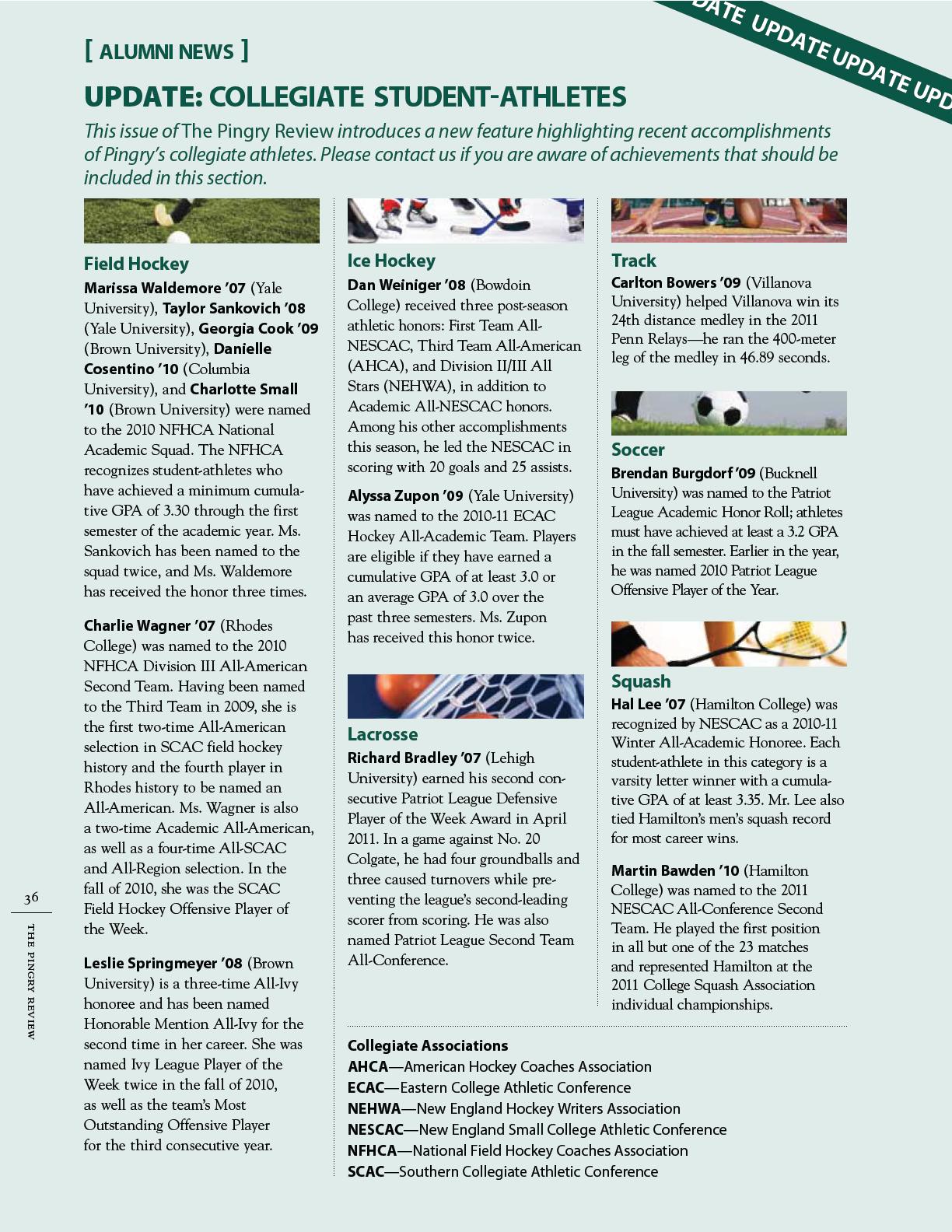
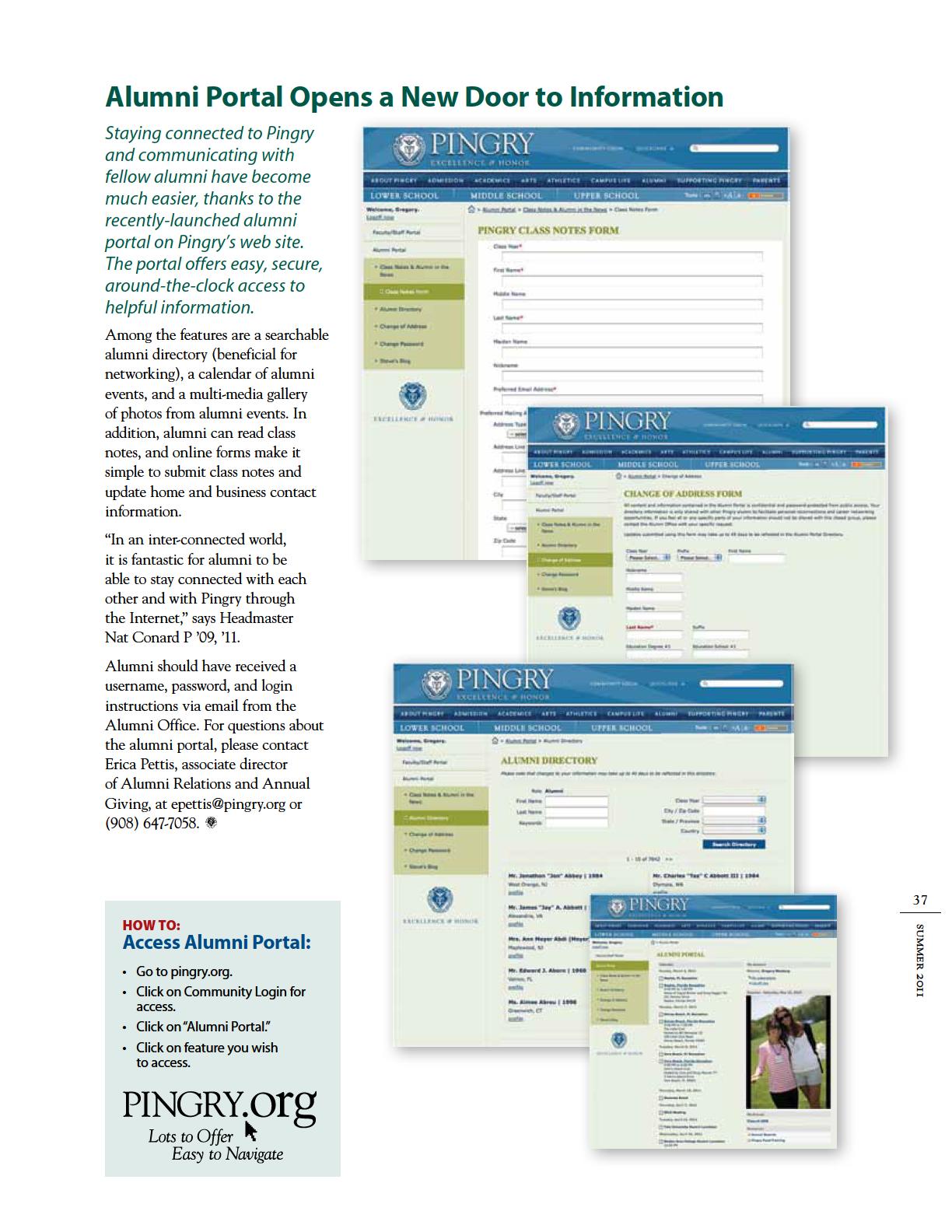
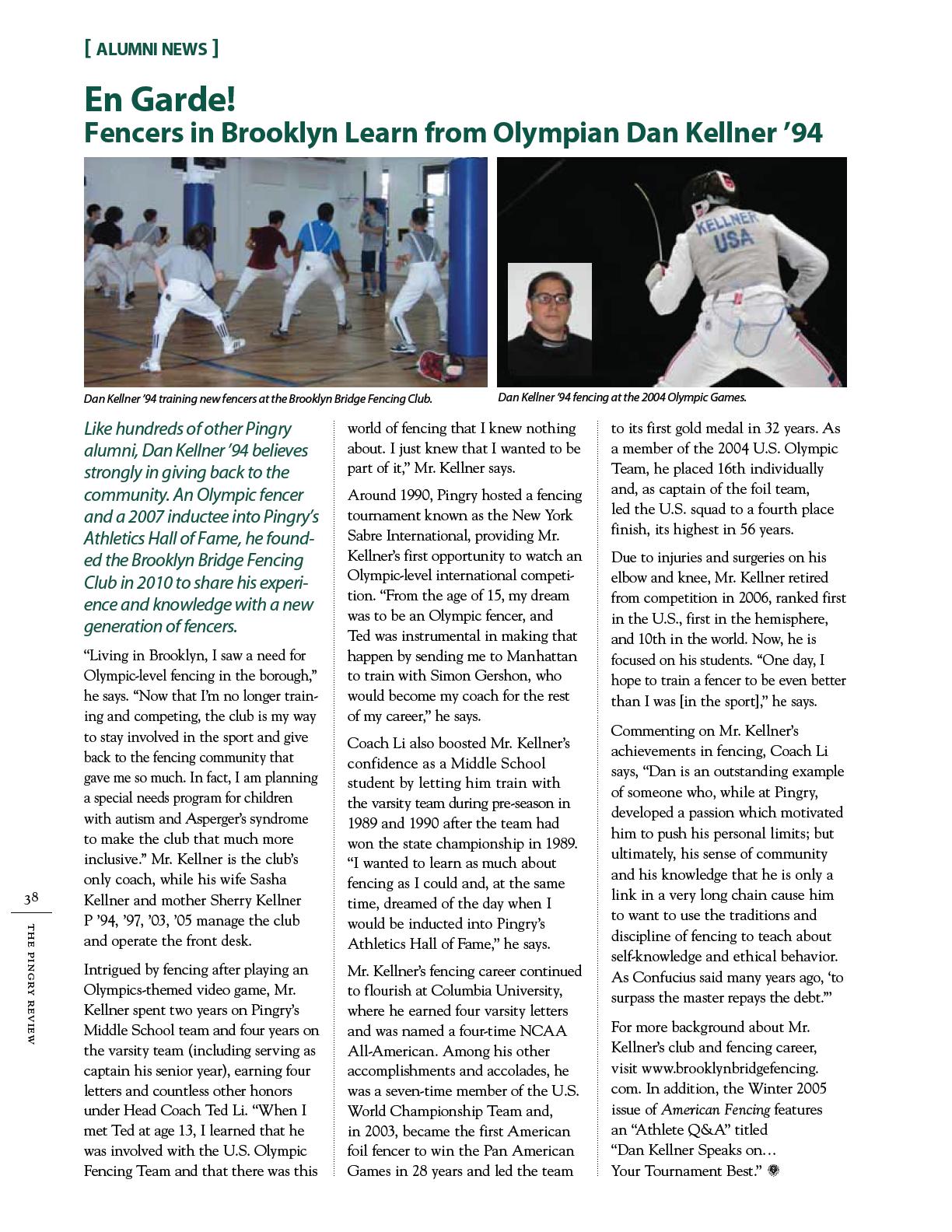
Keynote Speaker Dr. Geoff Duyk ’77, Partner and Managing Director of T.P.G. Biotech, L.L.C., joined 38 other alumni for Career Day. Juniors and seniors were given the opportunity to learn about prospective careers in finance, law, medicine and science, media, performing and visual arts, public service, and other fields. The alumni emphasized the importance of exploring interests while in school, networking, securing internships, and being passionate about what you do for a living.
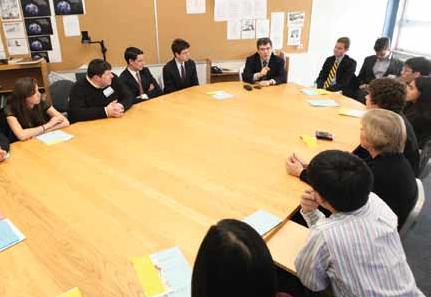
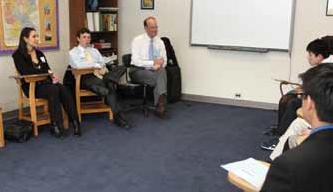
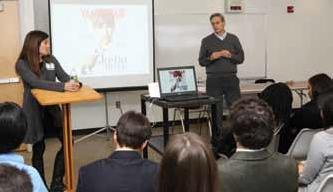

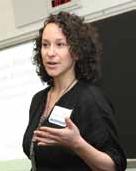
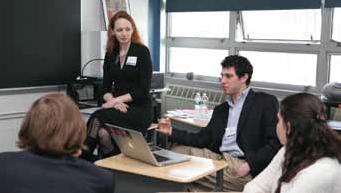
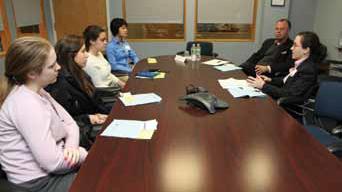
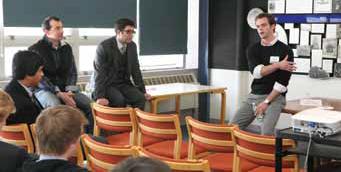
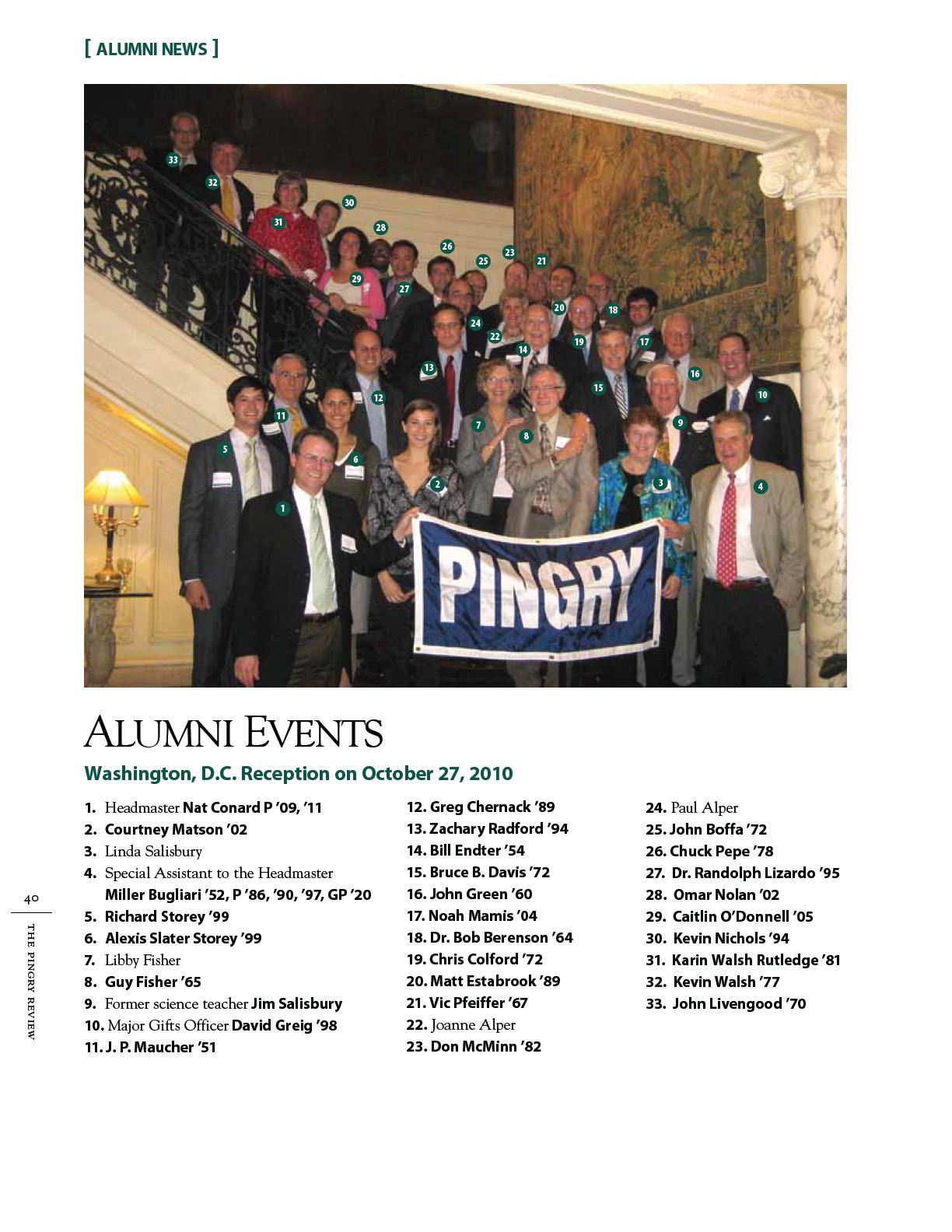
Adapted from a speech delivered at the Princeton Alumni Reception by Pingry history teacher John Crowley-Delman ’97
On a snowy day this winter, I watched Munyurangabo, an obscure foreign film which, oddly enough, helped me better understand the role that a diverse student body plays at Pingry.
The film takes place in Rwanda more than a decade after genocide left 800,000 dead. Two teenage boys, Munyurangabo, a Tutsi, and Sangwa, a Hutu, embark on an odyssey to find and kill the man who murdered Munyurangabo’s father in that ethnic carnage. Although they are best friends, their relationship suffers from
“Pingry
students are challenged as never before by a broad range of ideas, perspectives, and arguments, which come primarily from the students themselves.”
HiStory teacHer joHn croWley-delMan ’97
their differing ethnic identities and the violent history of their country. With a thoughtful script and skillful cinematography, the film is quietly powerful when it so easily could have collapsed under the emotional weight of its subject matter.
A remarkable Rwandan film must have a talented Rwandan filmmaker, I thought. But as it turns out, the director of the first film ever made in Rwanda’s native language is a 29-year-old Korean-American, Lee Isaac Chung, who grew up in rural Arkansas and studied biology at Yale. How could Mr. Chung produce such a film?
The answer lies, at least in part, in his early struggles with cultural identity.
As he told The New York Times, “I’ve never felt completely American. Growing up where I was, there were no Asians, no minorities, and there was always something to remind me of what I’m not. And when I go to Korea, it’s the same thing. I’m constantly reminded that I’m not Korean.”
Being part of two cultures, yet feeling rejected at some level by both, probably contributed to Mr. Chung’s sensitive approach. Armed with a rough outline and a camera, he hired a translator and recruited amateur actors from Rwandan orphanages. Mr. Chung worked to get everything right—from physical movement, to the stories told, to the rhythm and poetry of the language. If the film wasn’t going to be made by a Rwandan, at least it would be made for Rwandans. He practiced empathy, and the result, in Mr. Chung’s words, “bridge[s] gaps between cultures.”
Practicing empathy and bridging cultural gaps are more important than ever. Last year, China’s economy emerged as the second largest. India, which boasts a booming economy of its own, may soon surpass China as the most populous country (it is already the world’s largest democracy). Egypt is currently undergoing a remarkable democratic revolution which is yet to be fully understood. In our own country, profound changes are happening, as well. The united States Census Bureau predicts that people of color will emerge as the collective majority by 2042. By 2050, nearly 20 percent of Americans are likely to be foreign-born.
Whether or not you agree with his politics, President Obama demonstrates the power that can derive from being able to operate comfortably in multiple cultural worlds. The son of a black Kenyan and a white Kansan, he is a Christian with an African-Islamic name. He spent his childhood in Hawaii and Indonesia. He had an elite
private school education, but became a successful community organizer in a low-income neighborhood of Chicago. His oratorical style, to my ear, at least, resembles that of both John F. Kennedy and Martin Luther King.
Our job as educators is to prepare students for a more interconnected world, and we have made important progress in doing so. Since Sara Boisvert became Director of Global Programs in 2009, Pingry has hosted students from Senegal, Guatemala, Italy, and Germany, and sent students and faculty to other countries, including China and Egypt. Led by Allie (Manly) Brunhouse ’00, the admissions staff has shaped a student body that is more ethnically, culturally, and socioeconomically diverse. Dr. Diana Artis, coordinator of Multicultural Outreach, has worked tirelessly to foster a community in which students and teachers are empowered to cultivate the kind of empathic abilities so vital to Mr. Chung’s filmmaking.
The result is that Pingry students are challenged as never before by a broad range of ideas, perspectives, and arguments, which come primarily not from their adult mentors but from the students themselves.
As a student and teacher of American history, I believe our shared story can be seen as a continuing struggle to perfect a nation built on visionary ideals articulated, but not achieved, at our founding. Similarly, our school’s history can be viewed as an effort to live up to the ideals of the Honor Code, the final words of which have greater meaning now than ever: “[The members of the Pingry community] should honor the rights of others, conducting themselves at all times in a moral and decent manner while at Pingry and throughout their lives as citizens of and contributors to the larger community of the world.”
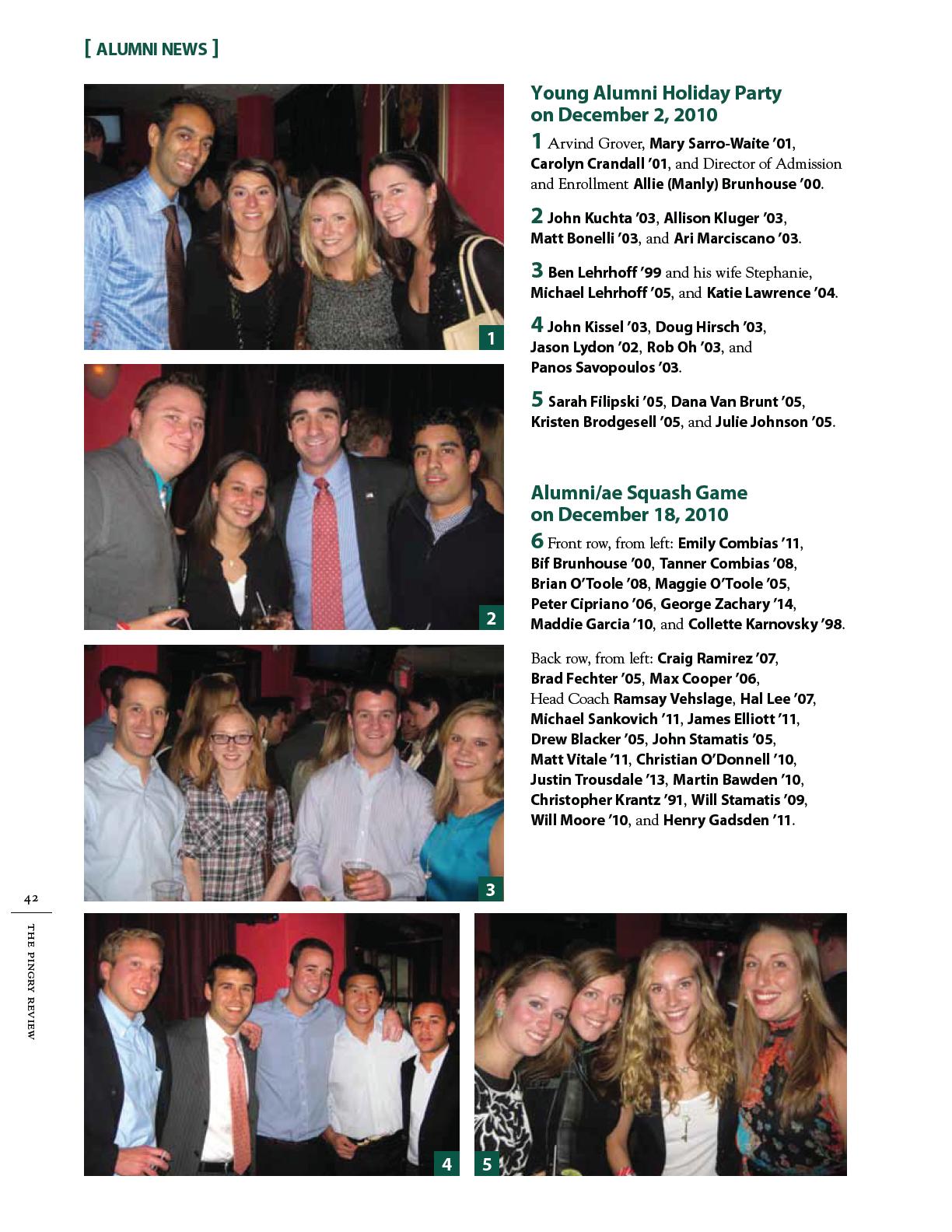
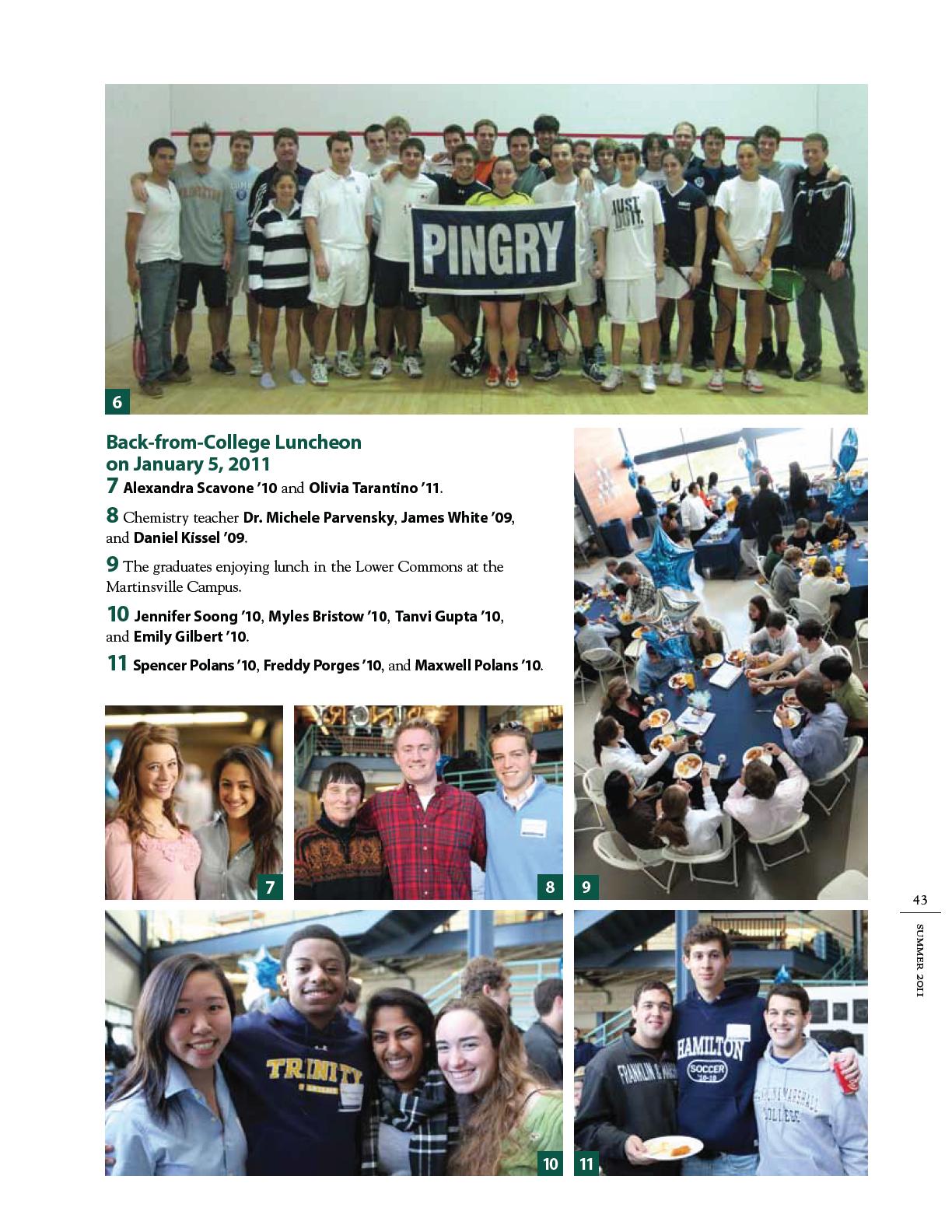
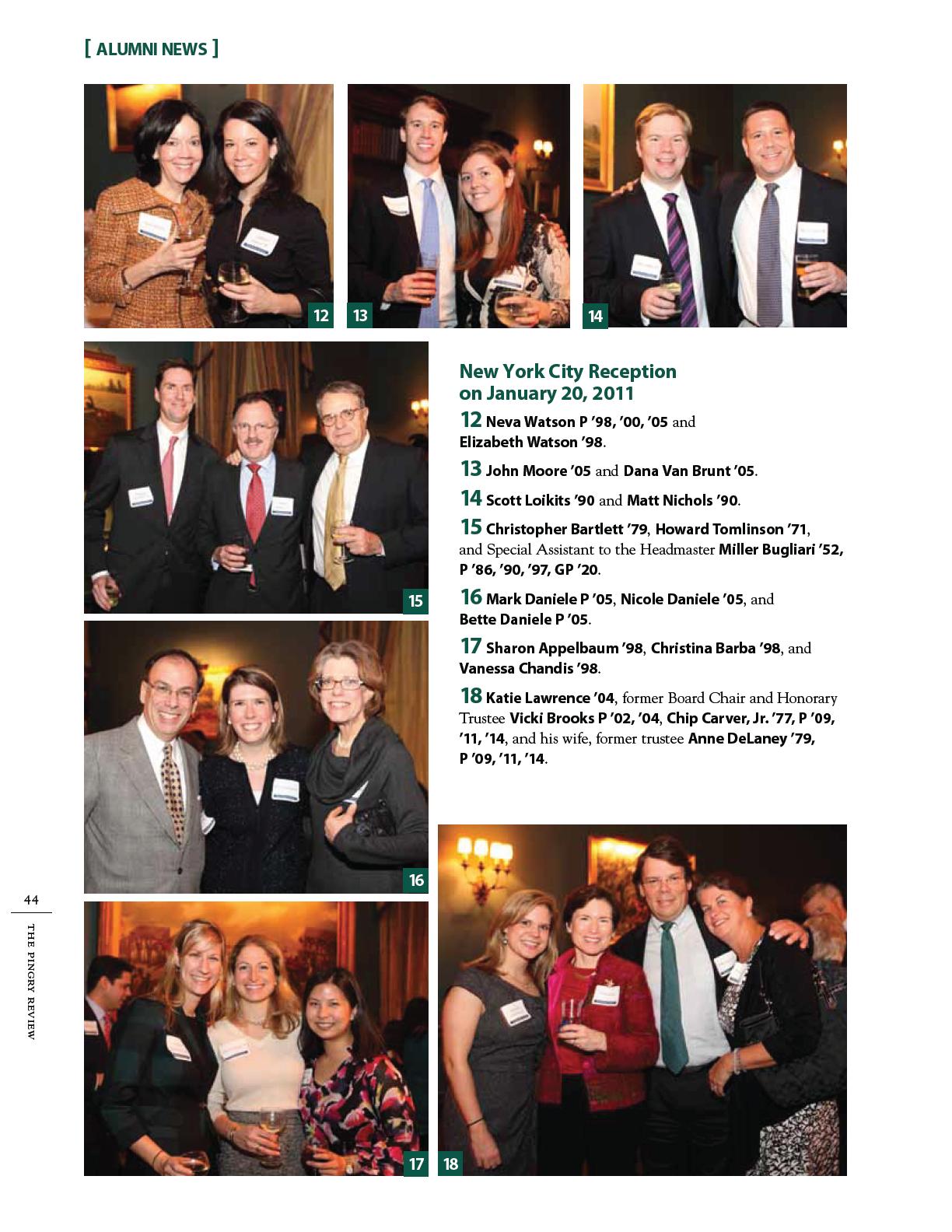
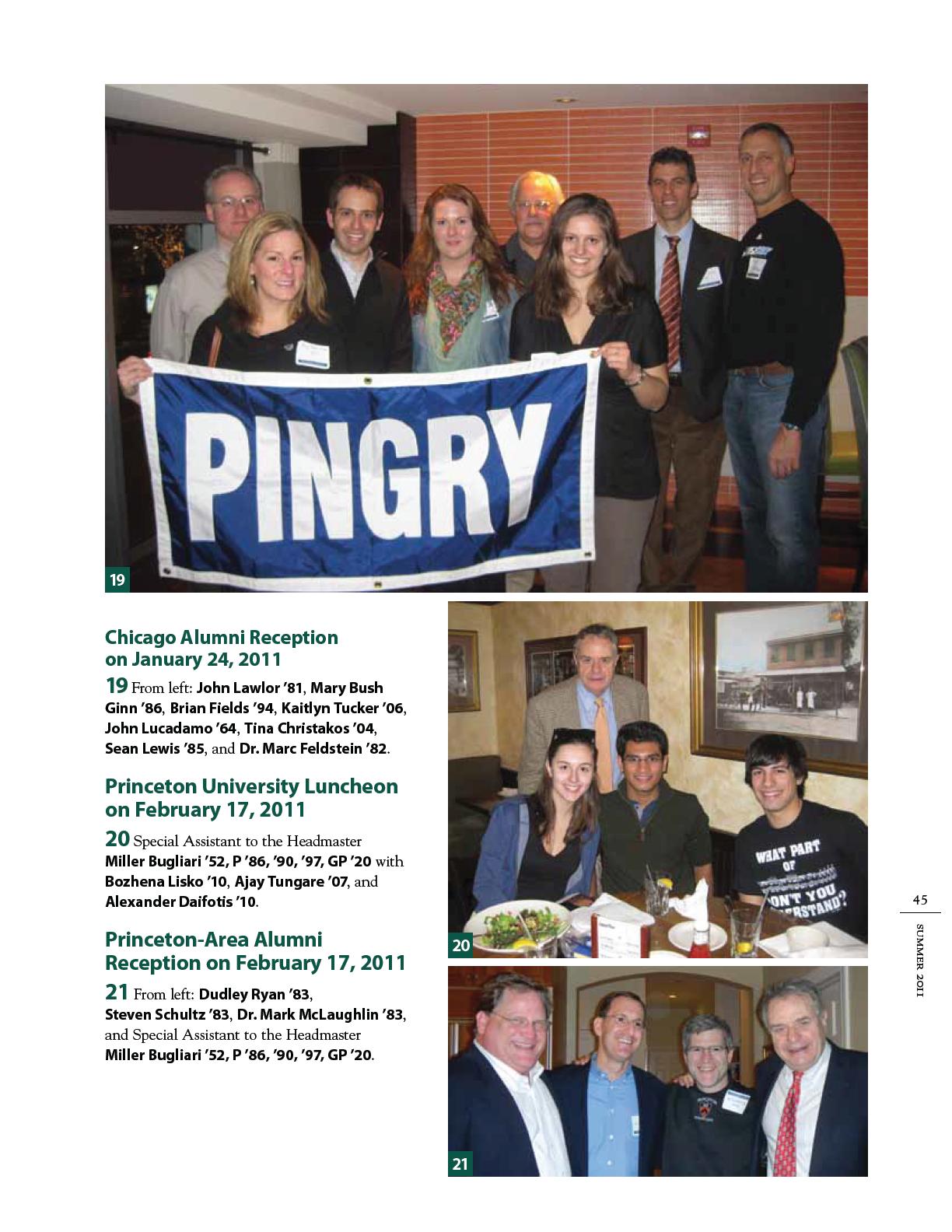
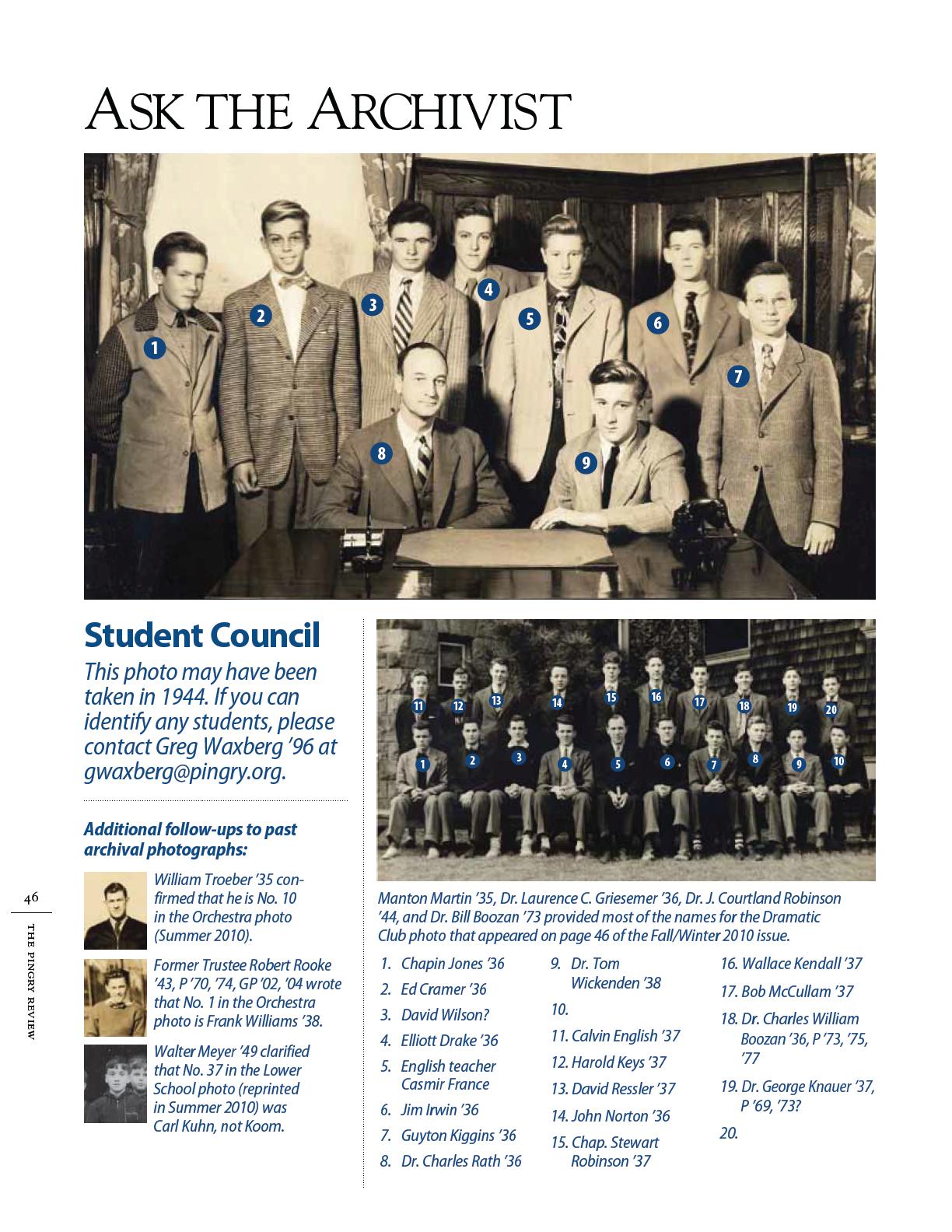


he opens the shed to push out his plane, and I look at this plane and both of the wings were folded in half. So I thought, ‘Why not? I’m 72.’ So we push the plane out near the runway and Ted says, ‘You must not talk to me for awhile because I have to remember all the things I have to do before we can fly.’ Now actually I think, ‘Why not? I’m 72, I’ve had cancer, and two valve transplants, etc.’ Ted takes out a screwdriver, unfolds the wings, puts a in few screws, and says, ‘We’re ready to go hop in.’ We are in the air, and WOW, what a thrill. I asked to put on the earphones and he says, ‘They don’t work.’ Now I’m nervous. Then we are flying at a high speed, I see his lips move, I see that smirk smile that I remember, and I knew he was going to turn the engine off! Now I think, ‘What do I have to worry about? Ted is in the plane, too.’ Off goes the engine and we glide and glide and, of course, go in circles. So I say, ‘This is great. Can we glide into the landing?’ Ted says, ‘What…do you think I’m crazy?’”
In 2010, Kurt Christensen was privileged to be father of the groom not once, but twice. In March, Kevin married Audrey Hunter, and, in October, Derek married Brooke Svendsen. Kurt is grateful that all four of his and Linda’s children are now married to wonderful spouses.
Charlie Ffolliott sold his last business in New England and is now officially retired. He and Lynn now spend their time between the ranch property in southeastern Arizona (very hot in the summer) and a mountain property in southwestern New Mexico near the Gila National Forest (cool in the summer). They consider themselves very lucky.
Dave Hilyard notes that he and his wife recently sold their old, jointly-owned family summer house in Maine (too much bickering among the owners) and made a charitable gift of their 65-year-old wooden sailboat (astronomical maintenance costs—eat or sail, you can’t do
Though not always overt, the Code sets one’s moral compass and provides direction and a code of conduct. As a current Flotilla Commander in the United States Coast Guard Auxiliary, the civilian branch of the United States Coast Guard established by an act of Congress in 1939, I often deal with fellowship, duty, and honor issues. The compass we use so frequently always tries to point as close to true north as circumstances allow, pointing at the North Star Polaris to guide us—no matter the age or condition of either the compass or the vessel it is guiding. I use this concept to illustrate that the Honor Code’s guidance applies no matter how old you are. The Honor Code not only acts as a personal guide or compass, but also teaches us to achieve our goals and direction using certain principles and conduct. We are guided to be trustworthy, responsible, and considerate of the needs of our shipmates.
A mandatory part of the training in the United States Coast Guard Auxiliary is called “Team Coordination Training” or TCT. To quote from the manual, “TCT is a program that focuses on reducing the probability for human error by increasing individual and team effectiveness. Safety has long been the Commanding Officer’s responsibility and, until recently, was assumed to be the logical result of finelytuned technical skills. USCG mishap data suggests that while technical skills are an essential component of any job, they alone will not ensure safety.” Individual responsibility and responsibility for the wellbeing of the group are paramount. This is an important life lesson also learned from the Honor Code.
John Anderson ’57 on the Honor Code
I attended the Tuck School of Business at Dartmouth College for an M.B.A. following college and military service and was student government president during my second year; it was known as The Clearing House in those days. As a result of my Pingry experience and the few years I spent at Hamilton College, I introduced the idea of an Honor Code during my tenure at Dartmouth, and we adopted an Honor Principle.
The Honor Code set a tone for me during those formative days at Pingry. I like to think it is and has been a part of me throughout my life. I’m not sure how it is introduced or reinforced at either school these days—vigorously, I hope.
Editor’s Note: Mr. Anderson’s actions at Tuck are also discussed in the feature article.
As I progressed through college and then my career, I realized that the Honor Code had influenced me to be not only truthful, but also forthright. This may seem like a fine distinction, but I think there are many people who are basically truthful, yet will shade answers and opinions to tell others what they seem to want to hear, especially those for whom they work. I felt that honesty should include being forthright, even at work, where the temptation to support supervisors’ and management’s opinions can be strong at times. People did not always like what they heard from me, but, after a while, I found myself being consulted more often because those in charge came to realize that they could count on my responses being what I really thought. Ultimately, this became an important element in my advancement—an unexpected result from continuing the Honor Code in my post-Pingry years.
both). However, the arrival of a grandson in June 2010 made the year a total success.
Dr. Charles Hodge reports that he and Cathy have now made Edgartown on Martha’s Vineyard their year-round home. Cathy has retired from being a nurse practitioner and become an accomplished carpenter and woodworker. Charles also retired, but he became bored after a month or so and is now a visiting professor of neurosurgery at the university of Maryland Medical Center in Baltimore. “This is a great job,” he says. “I get to teach the excellent residents there and participate in many surgeries, all this in a vibrant academic environment. Best of all is a lack of administrative duties and every fourth week off.” The Hodges’ primary enthusiasms right now continue to be their three sons, six grandchildren, and sailing on their 44-foot sloop, Surprise. They have sailed in the waters around New England, Nova Scotia, Bermuda, and the Virgin Islands. Classmates are welcome to come see them in their New England paradise—especially those who might yearn for a little sailing.
Jan Kennedy recalls that it seems like both a long time and a short time since his 50th reunion. He writes, “For Claire and me, it was a wonderful 50th reunion, and it seems like yesterday that we were in class together, singing in the Glee Club or Octet, playing soccer, wrestling, or tennis, and thinking about where we wanted and could get into college. Where did the 50 years go? The unfortunate part of the reunion was that we had to leave, and the wonderful and funny emails and conversations stopped. Why is that? Yes, we all are very busy with our families and grandkids for some of us, but can we reverse the situation and get back together?” Jan’s son Todd Kennedy married his sweetheart Holly in October 2010. His daughter (also a Holly, but a Camlin) has been married for eight years and has two great children: Isabella (6) and Sawyer (3). Jan notes, “It is amazing how different your daughter’s wedding is from your son’s wedding—not only in cost, but involvement.”
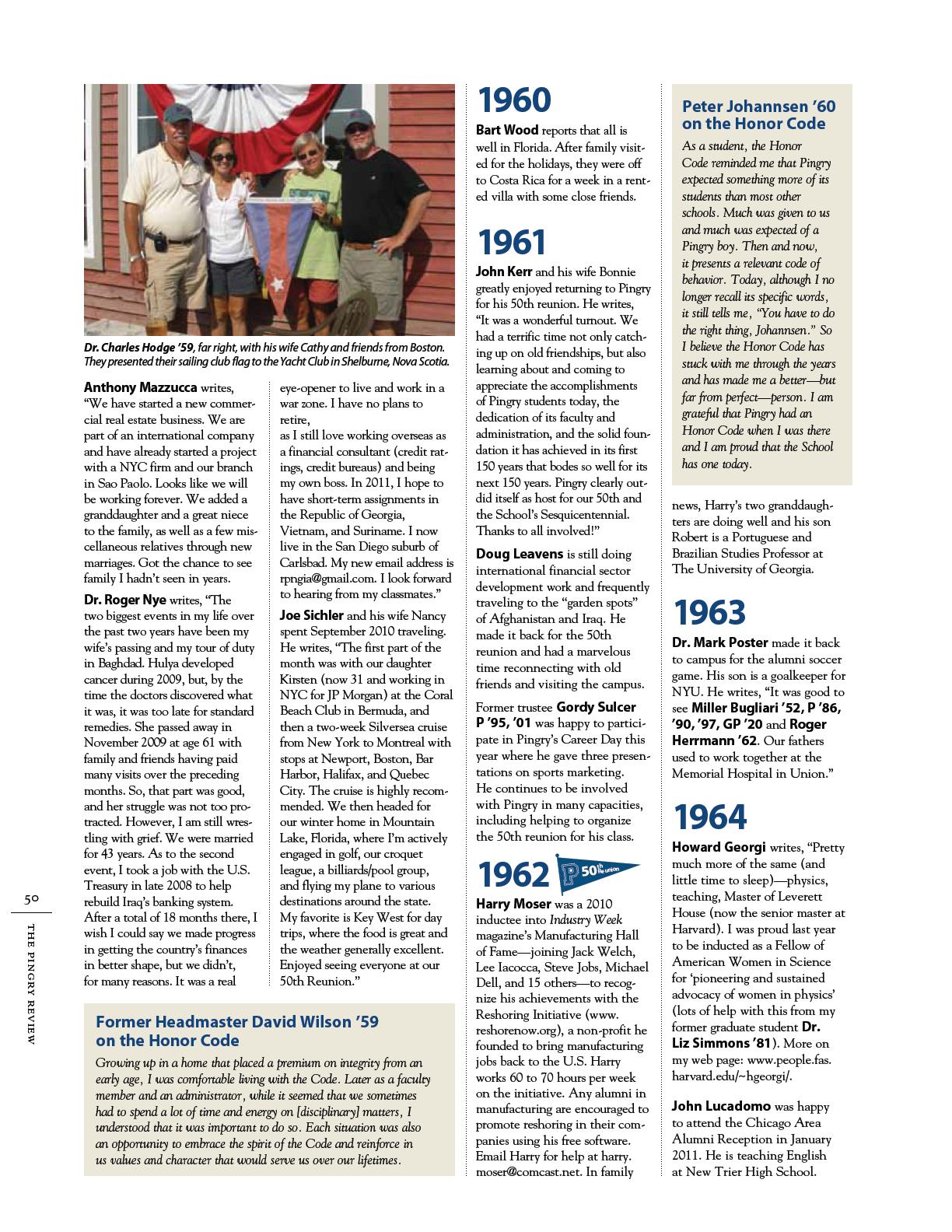
1965
Robert Dwyer writes, “I ran into and recognized Rick Ill ’61 on the train to Philadelphia in December 2010. I had last seen him at his graduation in June 1961 when I was in the Second Form. I replayed for him my memories of his pass to Pete Hilgendorff ’61 for a 65-yard TD to tie Peddie and preserve the 1960 football team’s undefeated season. Funny what things stick in your mind for 50-plus years.”
1966
Jon Cumpton writes, “I’m enjoying life as a horse farmer and house husband in northwestern Wisconsin while my young wife toils in the corporate world. I do spend some time reading Carl Youngdahl’s rants on Facebook. We are looking forward to Coach Bugliari’s next visit to the Twin Cities. I am most enjoying my new role as a grandfather!”
Bruce Schundler writes, There’s been a change in our plans—we won’t be going to Mesa Verde National Park in Colorado this year. Instead, we’ll be returning to the Statue of Liberty and Ellis Island. We had a great time at Pingry for our 45th!”
1969
Doug Goodkin, Curt Valmy, and Lew Buchner met in the summer of ’09 in San Francisco to celebrate the 40th anniversary of Doug’s pole vault record that never was announced at lunchtime news. A healing ceremony was held that allowed Doug to get on with his life and resume his pole vaulting career.
Trustee Ian Shrank graduated from Harvard College and Harvard Law School and worked for 32 years in two international law firms. He works or volunteers for various non-profit organizations and was happy to return to campus for Career Day, to discuss a legal career.
David Rapson was happy to host the San Francisco Bay Area reception in July 2011.
BRICK CITY, a Peabody Awardwinning documentary of which Vanessa (Procopio) Pumo serves as Senior Editor, began its second season on the Sundance Channel on January 30, 2011. For more information about BRICK CITY, see Vanessa’s class note in the Fall/Winter 2009 issue of The Pingry Review
Dr. Robert King P ’07, ’12 spoke at Career Day about his career in finance. He is a Managing Director of Investment Banking at Goldman, Sachs & Co.
Trustee and PAA President Steve Lipper P ’09, ’12, ’14 spoke at Career Day where he presented on the various areas in the marketing field as a career choice. He and co-presenter Lisa Hyman Sackman ’90 covered strategic marketing, product marketing, and promotional marketing. He was impressed by students’ thoughtful
Dr. Larch Fidler ’69 on the Honor Code
The Honor Code instilled in us a sense of responsibility to the school’s reputation, to ourselves—being the best people we could be—and to one another as members of the community. We had an obligation to other human beings as part of our social responsibility. As a student, I quickly felt like I was part of a team because the Honor Code created a bond among all of us. Both schoolwork and interaction with peers were honest. I was influenced by teachers who modeled the Code and taught what it meant to take responsibility for each other. Overall, the Honor Code gave me a sense of optimism and trust, so, as an educator, I trust my students. Simply put, you are judged by and responsible to your peers, direct results of student ownership of the Code.
Trustee Genesia Perlmutter Kamen ’79 on the Honor Code
I tell my children, “Fail if you must, but never cheat.” There are always ways to make up for doing poorly or other paths to follow, but the consequences of being caught cheating can cause irreparable damage. As a Pingry student I liked having the Honor Code because I liked being trusted not to cheat. However, now I see the Honor Code as so much more, and I am grateful that my children are at Pingry where they, too, are immersed in the culture of the Honor Code. I firmly believe that the Honor Code is for life, and learning to live by it is one of the most important and long-lasting benefits of a Pingry education.
Just a few months ago, I was struck by a powerful example of what can go wrong when the Honor Code or its equivalent is not deeply inculcated into the fabric of one’s being. One morning, I read in my newspaper that the German Defense Minister Karl-Theodor zu Guttenberg was forced to resign after it was discovered that he had plagiarized large portions of his doctoral thesis. He was also stripped of his Ph.D. Prior to this, Mr. Guttenberg, an aristocrat by birth, was popular with voters, had a bright political future, and was considered a possible candidate for chancellor. Now, instead of completing his work of restructuring the German army and continuing on his chosen path, he is disgraced and known as Baron Cut-and-Paste. After reading the article, I said to myself, “This is a really good example of why it is better to live by the Honor Code.”
and engaged questions and also enjoyed having his son Matt ’12 participate in his session.
Steven Brisgel, First Vice President of Morgan Stanley in Florham Park, was recently named by direct Gubernatorial Appointment to the New Jersey State Board of Dentistry as a Public Member. The Dentistry Board, which is part of the New Jersey Attorney General’s Division of Consumer Affairs office, oversees the dentistry profession within the state. The board licenses, disciplines, and regulates dentists, periodontists, orthodontists, endodontists, and oral and maxillofacial surgeons. The Board works closely with the New Jersey Dental Association, American Dental Association, North East Regional Board of Dental Examiners, American Board of Dental Examiners, and uMDNJ-New Jersey Dental School in Newark.
Julie-Anna Falconer Vogel writes, “After four wonderful years in Vancouver, my family and I began 2011 by moving to Beijing. Fingers crossed that this latest adventure will be an exciting one.”
Jackie (Sloane) Kahan writes, “I’m starting to work on obtaining my Certificate in Interior Design at Parsons and very excited about it!”
Dr. elizabeth Simmons lives in Okemos, Michigan, where she is a professor of physics at Michigan State university and the dean of its undergraduate residential science college, Lyman Briggs College. She and her husband Sekhar Chivukula (also a physics professor at MSu and an associate dean in its College of Natural Science) enjoy the usual sorts of family activities together: researching the origin of mass, teaching about partial differential equations and complex analysis, and doing hands-on demonstrations about subatomic physics at science fairs. On the more exotic side, they enjoy baking bread, saber fencing (with younger son Anand), and trying to grow flowers that the local deer herd won’t devour. Their older son Ari is a computer science major at u of M who hopes to convert his parents from Fortran to C++. Facebook has been a great way to connect with Pingry friends across the country, so look for Elizabeth there!

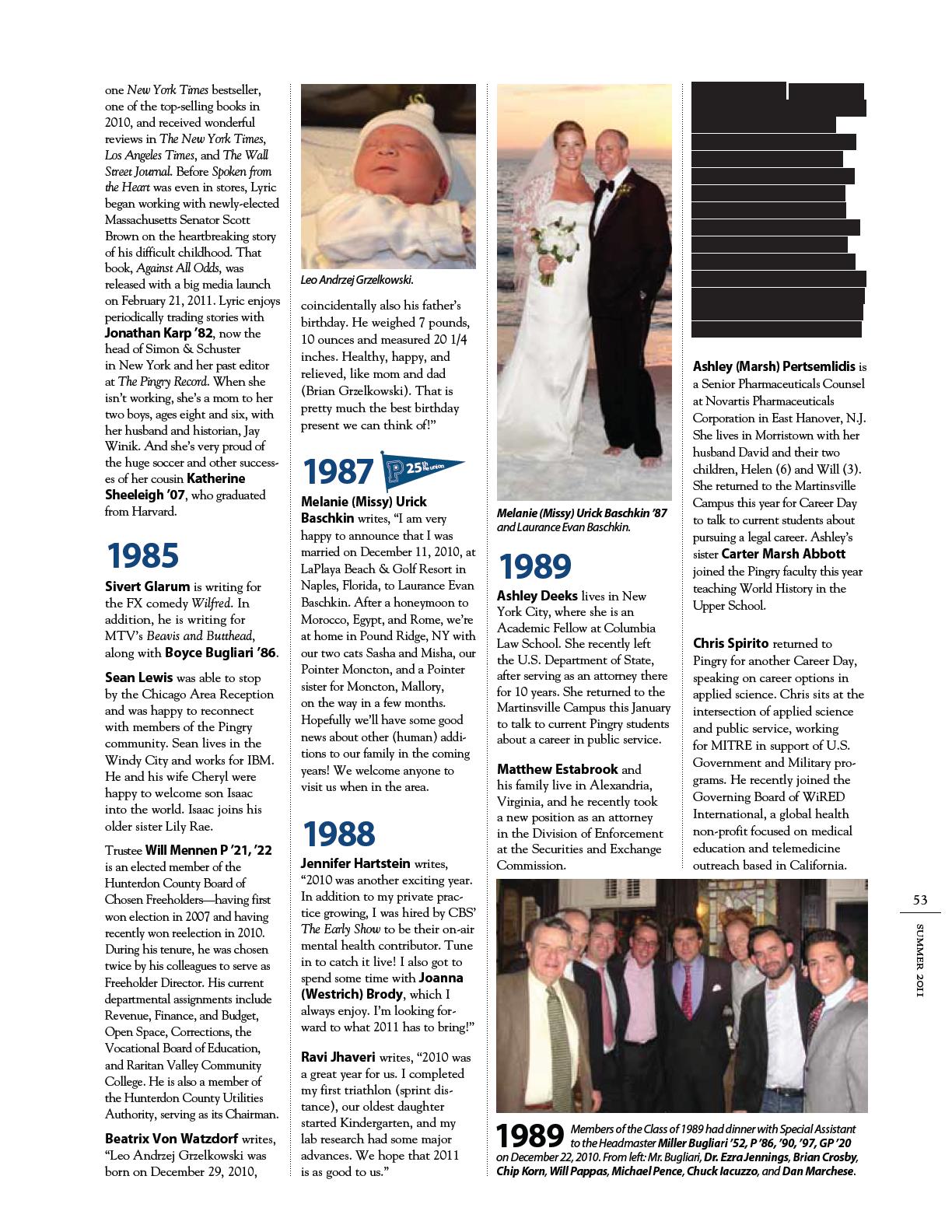

(But not before Headmaster’s Break!) Hope everyone is safe, happy, and healthy. E-mail anytime... apu@VolunteerEMS.org or apu@nocservices.com.”
Alex Baydin writes, “I live in Madison, N.J. with wife Lindsay, three-year-old daughter Layla, and our newest arrival, Emily, born on February 25, 2011 and doing great. I have been busy with my start-up PerformLine, an Internet advertising technology that helps advertisers protect their brand online and stay compliant with their industry’s advertising regulations. Lindsay is the Pingry Lower School art teacher. We have had fun reconnecting with the Pingry community through Lindsay’s work and remain in touch with a lot of our Pingry friends. Go Big Blue.”
Mike Bender and Doug Chernack ’92, creators of the popular web site AwkwardFamilyPhotos.com, have launched a new web site called Squabbler.com, where people can upload 30-second arguments and let the viewers decide who’s right. They hope the Pingry community will check it out and send in a squabble.
Todd “Boat” Ferrie and his wife Jennifer are proud to announce the birth of a baby girl, Cameron Padgett Ferrie. She was born on November 29, 2010. Everyone is doing well and resting at home in Chatham, N.J.

Sophie Eileen Sostowski Herbes.
Kristin Sostowski and her husband Steve Herbes welcomed their third daughter, Sophie Eileen Sostowski Herbes, on November 5, 2010. Sophie weighed 7 pounds, 5 ounces and measured 19 1/2 inches. She joins big sisters Catherine (6) and Madeline (3). Kristin is a partner at Gibbons P.C. in Newark, where she specializes in employment law.
Chris ulz and Hilary (Sunyak) ulz ’96 welcomed their first child, Olivia Tatjana ulz, on September 5, 2010. They are all doing great.
Perry Blatt reports that, over the holiday season, his fantasy football league had its annual celebratory dinner at the German bar Lederhosen in NYC. The league comprises several ’94 alumni, including Jason “BV” Lebersfeld, Mike “Nino” Paget, Josh “Slippery” Slavitt, Tucker “Stump” Siler, and Kevin “Meatle-tae” Korn Dick “Dickle-pie” Paget ’87 is also in the league and serves as its elder statesman and grand master. Our league is pleased to announce that Tim “Peeper” Parliman won the championship this year by besting Aaron “the Gmish” Slater in a hotlycontested match-up. The group was surprised at the league dinner by fellow ’94 graduates Christian Hoffman and Harlan Rothman, who eagerly joined in the German-themed festivities.
Matt DeFazio writes that he journeyed up to Ski Big Bear in the Poconos Mountains and went skiing for the first time. He enjoyed skiing and is planning to go again in the near future.
Palmer emmitt writes, “After nine years in Los Angeles, where I often spent time with Dave Bugliari ’97, PJ Lewis ’95, Mike Corcoran, and Jamie Shapiro ’97, I recently moved to Sonoma County wine country. I’ll be attending the MBA in Wine Business program at Sonoma State university and working as a marketing consultant for wine web site TastingRoom.com.
David Berkeley Friedland (performing under the name David Berkeley) released his fourth studio album this year, Some Kind of Cure. Most of the songs were written while David, his wife Sarah, and their then one-year-old son Jackson lived for a year in a mountain village on the island of Corsica. He has also written a book of stories, 140 Goats & a Guitar: The Stories Behind Some Kind of Cure David has been a guest on
NPR’s This American Life, has written songs for TV, and performs his music all over the world. He lives with his wife and two sons in Northern California.
Matthew Jaskol’s Beijingbased company Trekiz.com won the 2010 Red Herring Top 100 Global Award, honoring the year’s most promising private technology ventures around the world. The site launched in midFebruary, offering a totally new online travel platform designed to make unique travel to China a reality. He’s also a proud new dad—his wife Amy gave birth to a beautiful baby girl, Talia Julie, on May 31, 2010.

Wayne Kasserman is an actor, a producer, and a creative director at NYCOLLECTIVE, a NYC creative design firm that provides opportunities for the development of talent and promotion of artistic culture in New York.
Dan Kellner has opened the Brooklyn Bridge Fencing Club in Brooklyn, New York. Read more about Dan and the club on page 37.
Norm Liang writes, “Lots going on here. Still living in San Francisco being busy with startup life. Last year, our son Jaden was born. Life all in all is good, but would love to catch up with any alumni coming out to SF for a visit. I’ve seen James Jen ’95 a few times traveling for work, since we both make games now.
Frank Liberato and his wife Robyn are living in Chatham, and they have a five-year-old daughter, Samantha Paige. She started Kindergarten in the fall of 2010 at Oak Knoll in Summit. Frank is director of
operations of a mid-sized general construction firm specializing in work for the pharmaceutical industry.
Matthew Mandelbaum’s PsySoEd Dynamics has signed a multi-year manufacturing and distribution deal for www.jumpingjoeysnumberline.com, the innovative Pre-K through elementary arithmetic learning system.
Megan (Franzone) Slater writes, “Nate ’92 and I celebrated the new year skiing in Telluride with our three-year-old son Miles. We continue to enjoy living in Oakland, California.”
Josh Slavitt writes, “Took a job working for and running single stock derivatives trading at MF Global, reporting to former N.J. governor Jon Corzine, now back on Wall Street and CEO of the firm. Nicole and I welcomed our second baby in June 2011 and plan to move to the N.J. burbs this summer after a 13-year run in NYC. I still see and do business with Tim Parliman and Tucker Siler, and I talk every day with Mike Paget, who is still enjoying his time in London. I also split Giant season tickets with Kevin Korn and Perry Blatt and plan on doing that again next year despite Big Blue’s collapse.
Beth (Roberts) Somers writes, “I have been living in Andover, N.J. for the last nine years. I have two children, Matthew (9) and Dillon (7), and am active with fundraising for their school and sports programs. I work full-time and am the Health & Welfare Benefits Manager for Selective Insurance, headquartered in Branchville, N.J. I have picked up golf and am a member of Newton Country Club, and my goal is to break 100 this upcoming season! I would love to hear from any Pingry alumni in the area.”
Amy Morris Stone writes, “I was so delighted to host Ashley (Rooney) Threeton, Heather (Rooze) Baird, Carol (Wilhelm) Knauff, and Rachel Wolf at my September 2010 wedding to Phil Stone. We were married in Solomons, Maryland and are splitting our time between London and New York City.
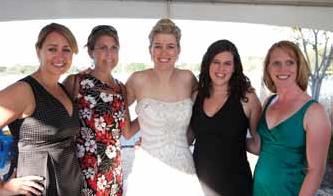

Christine Treveloni and her husband Dave welcomed Samantha Lucia Reidenbach into the world on April 29, 2010, nine days before Lorrie (Meyercord) Dana and her husband Neil’s baby girl Luna Ruth Dana arrived. Like their moms, they are happy, healthy, chatty buds. They still love living in San Francisco.
Laura (Campbell) Casey writes, “We are doing well and happy living in Charlotte, N.C. Our sons Brooks (5) and Coleman (3) are a ton of fun. I am an interior designer and write a weekly design blog www.lauracaseyinteriors.com.”
Courtney Disposti recently founded a small business, 2nd Mouse Media, that handles social media management for other small businesses. She writes, “Basically, I can manage the online presence of your small business on social media web sites such as Facebook, LinkedIn, Twitter, Myspace, YouTube, etc. It has been an exciting new venture and a great complement to my primary career in equestrian events management.”
Kim Havens and Will Heidel welcomed Alexandra May Heidel to the world on August 26, 2010.


Dexter Jones (above) writes, “After six years in Florida, I’ve relocated back to New Jersey, and I’m living and working in Linden as a personal trainer. I regularly talk to John Flack and Nicole Gregoire Chang ’97, and I’ve also been in touch with Liana Swart everaert. Hope all is well with the Pingry family!”
Karen Baldomero Mesonas and her husband Lenny welcomed Juliet Paige on July 5, 2010. She weighed 7 pounds, 4 ounces and nearly doubled her birth weight in only 3 1/2 months. She joins big sister Ana.
Gwyneth Murray-Nolan writes, “Hi to everyone. My husband John A. Forsman III and I

continue to reside in Hoboken, N.J. In July 2010, we purchased a home in Brielle for the summer and weekends. We are now closer to our boat and to my family, which is great. In the spring, we visited Italy, Spain, and Monoco for a wonderful 10-day vacation. We are looking forward to a schedueld trip with my family to Egypt in 2011! I continue to work in defense litigation and, in October, I was sworn in to the New York Bar.”
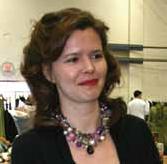
For the third consecutive year, Meri Sulcer (above) participated in the Big Blue Boutique (the PSPA Fall Benefit), where she displayed and sold her custom design jewelry, Miss Meri Jewelry. Her pieces combine traditional and contemporary designs. Check out her web site, www.merisulcer. com, to see her collection and look for upcoming shows.
Alex Brounstein is the proud owner of Grindhouse Killer Burgers. He opened his first location in September 2009 inside the historic Sweet Auburn Curb Market in Atlanta. A second, larger, stand-alone location opened in April 2011 close to Atlanta’s Buckhead district.
Alex obsessively researched the details for his burgers: the beef is freshly ground by a small North Carolina producer and delivered every day, consisting of a secret blend of chuck and brisket; and the bun is a soft potato roll made by a Pennsylvania Dutch bakery. Turkey burgers and veggie burgers are also available. The restaurant recently won the distinction of “Best Veggie Burger in Atlanta” by Creative Loafing newspaper, as well as “Best Chili” at the Chomp & Stomp Chili Cook-Off.
Adam Keil married Elizabeth Ann Plotkin on November 20, 2010, at Maplewood Country Club. Both of them work in New York—Adam is a Senior Vice President at Moelis & Company, and Elizabeth is an Assistant Trust Officer at Citigroup. Attendees included Sarah (Keil) Chernoff ’99, Heather Keil ’02, Noah Keil ’05, Amanda (Lehrhoff) Hershon ’99, Benjamin Lehrhoff ’99, Nicole (Lehrhoff) Stahl ’99, Michael Lehrhoff ’05, Kyle Mitschele, Rob Baldwin, eric Lo, Dan Pincus, AJ Plotkin ’94, and Mike Chernoff ’99 Hilary (Sunyak) ulz and Chris ulz ’93 welcomed their first child, Olivia Tatjana ulz, on September 5, 2010 They are all doing great.

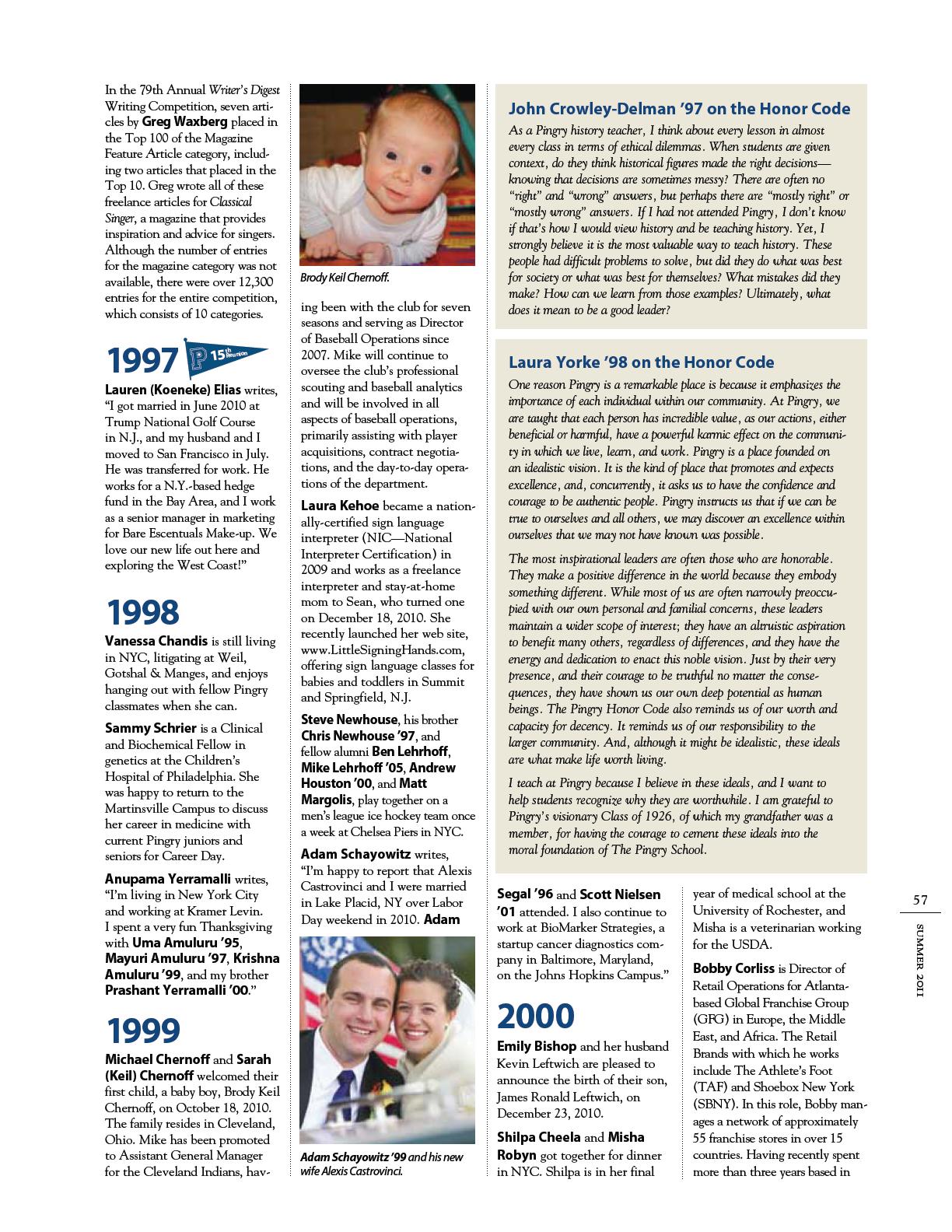
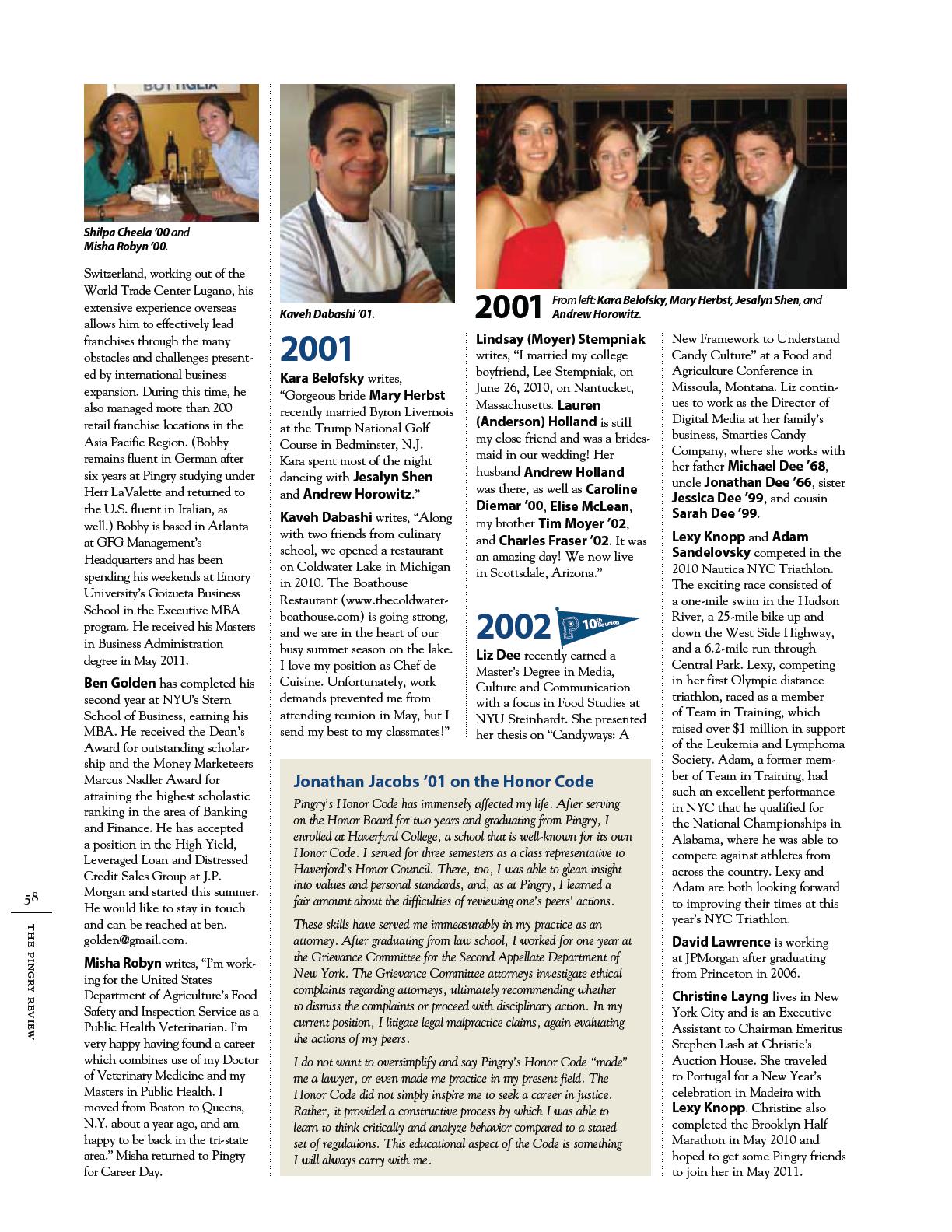
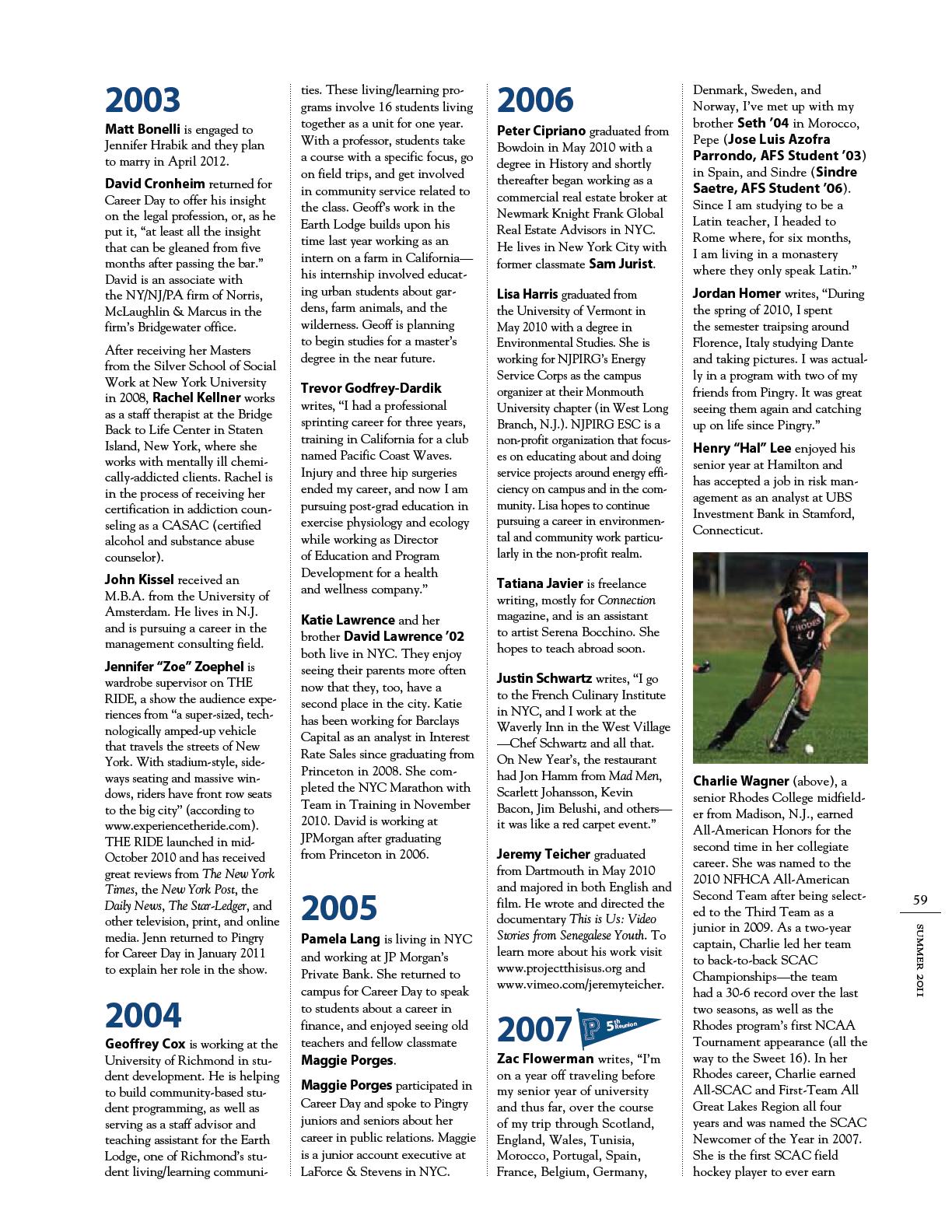
All-American Honors twice and the first Rhodes player to ever earn Second Team recognition. Charlie’s final collegiate field hockey game was a national coaches’ invitation-only senior all-star game at Christopher Newport university [the founding president of which was former Pingry headmaster H. Westcott Cunningham ’38, P ’78, ’80] on November 21, 2010, just prior to the national championship, where she fittingly recorded an assist.
Luke Beshar, a rising senior at uSC, is pursuing a joint degree in business and cinematic arts. He studied in Copenhagen at the Copenhagen Business School during the spring term.
Zach Carr, a rising senior at MIT, is majoring in physics and finance, with a minor in economics. He is a member of the varsity baseball team. elizabeth Homan, at the university of Richmond, writes, “Last summer, I studied abroad in Peru. I’m taking two courses on health care, and I declared a major in political science with a focus on health policy.”
Matthew McCurdy, at the university of North Carolina, Wilmington, is majoring in marine biology. Studies include sciences like biochemistry, genetics, and animal physiology, with some Spanish and other stuff in between. He also enjoys surfing during his spare time.
Hal Lee ’07, Brian O’Toole, and Martin Bawden ’10 met up at the Dartmouth CollegeHamilton College squash match on November 21, 2010, at Dartmouth College; Dartmouth won the match 9-0. Hal, Brian, and Martin played squash at Pingry, and all three served as captains during their senior years. Hal and Martin are the first Pingry squash alumni to play together in both high school and college—Hal was the captain at Pingry in his senior year when Martin was a freshman, and, at Hamilton, Hal was again the captain of the team when Martin was a freshman.
Angela Ramirez, a rising senior at Yale, traveled to Jordan last year to work at a Palestinian

Refugee Camp. She did some research on a rebellious group in the northern part of Indonesia, then headed to Hong Kong in March 2011 to participate in a Social Justice conference.
Garrett Schuman is double majoring in government and Spanish at Georgetown university. He is also involved in the all-male a capella group, the Georgetown Chimes.
Trevor Topf, a rising senior at Georgetown university, is majoring in government with a focus in u.S. political systems and political theory.
Patrick Trousdale has finished his third year studying economics at Georgetown and studied abroad in Copenhagen with DIS (Danish Institute for Study Abroad). His Pingry classmate Luke Beshar, studying at uSC, also spent his spring semester in Copenhagen.
Maya Artis, a rising junior at Kenyon College, is the musical director of an a capella group.
Brendan Burgdorf, a rising junior at Bucknell university and a forward on the men’s soccer team, was named 2010 Patriot League Offensive Player of the Year, was a First Team All-Patriot League selection, and was named to the 2010 NSCAA (National Soccer Coaches Association of America) Men’s Division I All-Mid-Atlantic Region Team (First Team). He was also one of 37 finalists for the Soccer News Net Player of the Year Award. As a freshman,
with her a capella group, The Vocal Chords, in the International Championships of A Cappella.
Dan Kissel is a rising junior at High Point university and made the Dean’s List the past three semesters. He is on the executive council of Pi Kappa Phi Fraternity.
Matthew LaForgia is majoring in economics and biochemistry at Brown university. He is still running cross country and track and his team took 8th at the NCAA Northeast Regional.
Brendan was an NSCAA Third Team All-Region selection and a Patriot League AllTournament selection.
Michael Doliner is a rising junior at Cornell university majoring in food science.
Matt Fechter writes, “I go to school at Colorado College in Colorado Springs and play soccer there. Last year we had a bad season. We went 7-9-3. I scored six goals and had four assists. But still made All West Regional All-American and All Conference. Education-wise, I’ve decided to major in economics with a minor in studio art. I absolutely love Colorado and the unlimited outdoor opportunities that reside within it. Snowboarding is my favorite activity. I went to the mountains (which include Breckenridge, Keystone, A Basin, Beaver Creek, Vail, and Telluride) over 40 times last year, and hope to go snowboarding as much this year. But I added Jackson Hole, Wyoming to my list of mountains to snowboard this past winter. Also, for the last three weeks of the past semester, I traveled to Taiwan to learn about the Chinese meditative arts, which include Tai Chi, Kung Fu, and calligraphy.
Diane Giangreco is majoring in Russian at Georgetown university. She is involved in the performing arts, and, in the fall of 2010, she tech directed for the Nomadic Theatre’s play Gross Indecency: The Three Trials of Oscar Wilde
Talia Hughes is a rising junior at Johns Hopkins university and competed this past February
Dan Levin writes, “I’m getting one of my poems published in the Provincetown Arts Review. It probably won’t be out until late in the summer. Also, I run the open mics at my school, and I hosted a big talent show this past winter. In the spring, I managed a big outdoor music event that I planned. I learned how to play the ukulele. I’m taking Japanese, and I’m planning to go abroad to somewhere in rural Japan next year. But mostly it’s the poetry thing. I’m getting really serious about writing, I took a workshop in NYC spring semester, and I’m studying under some pretty preeminent poets at school. It looks like I’m on track to go to graduate school for creative writing, either for an M.F.A. or a Ph.D., and I think I’m going to try to pursue a Rhodes Scholarship after school.”
Averill Morash is a rising junior at Muhlenberg College and enjoys being involved as a tour guide at school.
Colleen Tapen is a rising junior at Georgetown university, majoring in sociology with a concentration in social justice anaylsis and minoring in STIA (science, technology, and international affairs).
Robby Allen caught up with friends and classmates at the Back-from-College Luncheon in January 2011 and writes, “I’m off to a great first semester. I love Washington university.”
Sofia Barrionuevo writes, “I am enjoying my time at Lehigh. I’m involved in Student Senate, Marketing Club, and business
careers in the Entertainment Club. I plan on attending a networking event in NYC to find an internship in marketing.”
Martin Bawden enjoyed his freshman year at Hamilton, where he is playing number 1 on the Men’s Division 1 Squash Team. He enjoyed playing in this year’s Pingry Alumni Squash Match, where he won a Pingry Squash bag in the raffle.
Brandon Brier writes, “After spending my first semester in a study abroad program in Oxford, I plan to intern with the bankruptcy estate of Lehman Brothers Holdings, Inc.”
Myles Bristow was featured on the cover of The Trinity Reporter in the fall of 2010 as a prominent member of Trinity College’s Class of 2014. In the article, he says, “I wanted to come to a school where I can do art. I cartoon, paint, and draw, and I dance and write poetry. I started a dance group in high school and I plan to do the same thing here.”
Allison Dadouris is a rising sophomore at Lafayette and was excited to return to campus in January 2011 for the Back-fromCollege Luncheon. She wrote, “I love school. I’m also so glad to be home [on break] with my friends.”
Will evenson is a rising sophomore at Ponoma College and writes, “I have been playing football for Pomona-Pitzer, have started playing rugby for Claremont, and am planning to major in molecular biology. Pingry has most certainly prepared me for all of this.”
Morgan Foster wrote while being home on winter break from Vassar College, “School has been amazing, and I’m excited to be back home visiting Pingry!”
Taylor Guiffre is a rising sophomore at Bowdoin and is involved with several things including varsity golf and the Athletic Council, as well as a volunteer with the Reader Association.
Tanvi Gupta wrote when she returned to campus during winter break, “I’m really enjoying my time at Columbia university. It’s great to be back at Pingry!”
erin James is attending Brown university and enjoyed coming
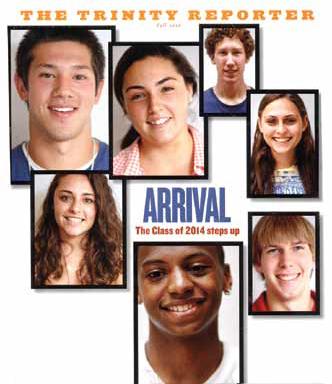
Myles
back to campus over winter break. She writes, “I missed my friends and look forward to seeing everyone at future Pingry events.”
Bozhena Lisko writes, “Last summer, I traveled to Russia, ukraine, Poland, Germany, Switzerland, Italy, and France. It was a wonderful time spent with my cousins and gave me a chance to unwind before my freshman fall at Princeton. I am interested in a degree in chemical and biological engineering and am involved in Engineers Without Borders, Society of Women Engineers, Princeton’s Africa Development Initiative, SVC (Student Volunteer Council) Impact Tutoring, and Princeton Against Cancer Together. It has been a wonderful start to my college experience.”
David Martin is a rising sophomore at Howard university.
He’s been enjoying DJ’ing at school functions.
Alex Molé finished his first semester at Wake Forrest. He joined the crew team and is planning to join a fraternity.
Victoria Morgan was on campus for the young alumni event in January 2011 and enjoyed seeing friends and faculty. She wrote, “I’m so glad to be back!” She is a rising sophomore at Vassar College.
Jasmin Neal reports, “I am attending my first year at Columbia university and loving it so far. I plan on majoring in neuroscience behavior, and I love running into Pingry classmates around campus.”
Christian O’Donnell enjoyed his first year at Lafayette. He enjoyed seeing fellow Pingry alumni at this year’s Alumni Squash match.
Share your news! Contact Associate Director of Alumni Relations and Annual Giving Erica Pettis at epettis@pingry.org, or The Pingry School, P.O. Box 366, Martinsville Road, Martinsville, NJ 08836.
Rainie Opel is taking a gap year and she returned to campus for the young alumni event in January 2011. She writes, “I had a great semester traveling abroad, but it’s so nice to see everyone and catch up!”
Anthony Parisi is a rising sophomore at the university of Pennsylvania. He returned to Pingry during winter break and writes, “I joined a pre-health care fraternity and love college.”
elisse Park is a rising sophomore at Georgetown. She enjoyed catching up with friends while home on winter break and had a great time at the Backfrom-College Luncheon in January 2011. She writes, “I had a great first semester at Georgetown.”
At the Back-from-College Luncheon held in January 2011, Freddy Porges, a rising sophomore at Hamilton, wrote, “I’ve had a great break. I’m looking forward to going back to school, but I’m going to relish spending time with my friends first.”
Nicholas Rice, a rising sophomore at George Washington university, attended the Backfrom-College Luncheon in January 2011 and reported, “School has been incredible so far. I’m glad to be home [on break] and visiting Pingry, but I also can’t wait for next semester.”
Suzanne Ritzdorf is a rising sophomore at SMu. She is in the Alpha Omega Community Service Club and declared English as her major.
Bennett Rosenbach enjoyed his freshman year at Johns Hopkins university and reports that he made the Dean’s List his first semester.
At the time of the Back-fromCollege Luncheon, Ali Rotatori wrote, “January Term just started here at Middlebury College. Term is just one month, when you take one class for about eight hours a week. I’m taking a class called ‘Statistics Applied to Sports,’ and I’m playing Intramural squash and hockey.”
Jen Soong, a rising sophomore at Harvard, writes, “I have been writing for The Harvard Crimson Arts Section, and it’s been a great experience so far.”
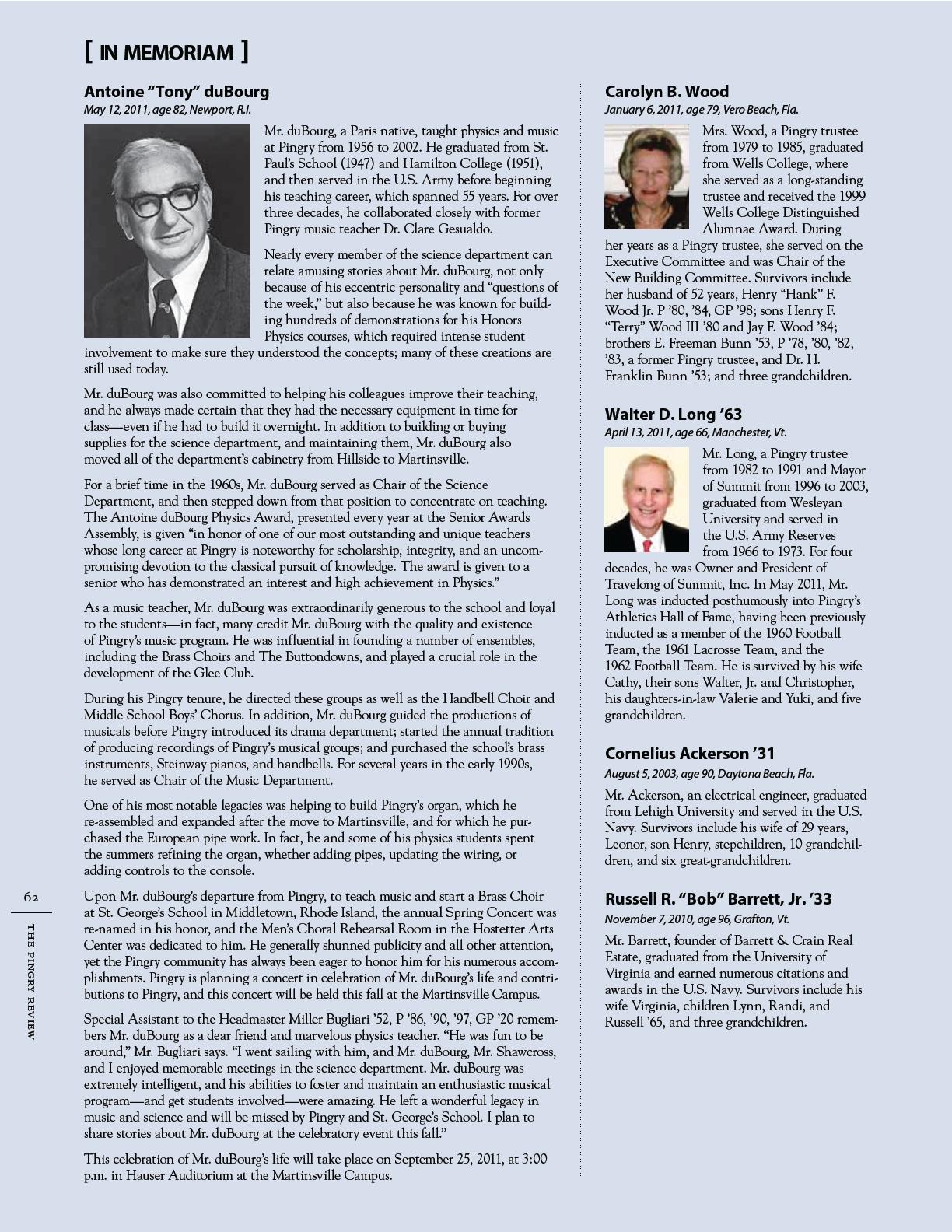
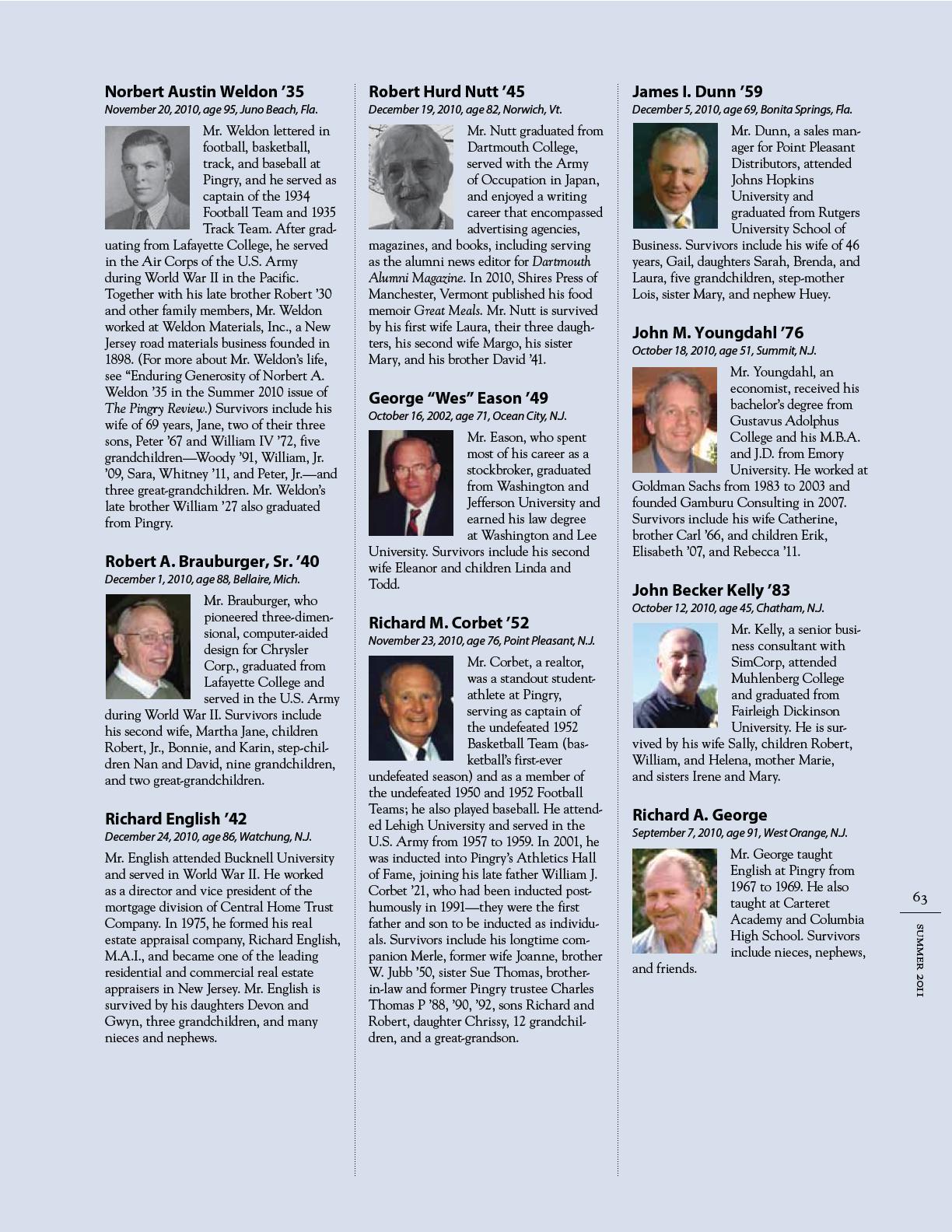
By Kathryn Kolb ’11, Chair of the Honor Board (2010-11)
The Honor Code is the most fundamental part of our value system at Pingry, and serving on the Honor Board has been one of my most rewarding experiences during high school. It is difficult to articulate all the ways it has helped me grow into the person I am today, but perhaps most obvious is the responsibility it has given me. That responsibility has come in many forms, such as maintaining confidentiality and unbiased judgment. In addition, to serve effectively, I believe all Honor Board members must be genuine role models and leaders for their peers. With these expectations, I must constantly examine my own values and hold myself to the highest standards of honorable behavior. I can never cease to improve myself and build on my ethics. So, this journey serving on the Honor Board has helped me look inward— to consider my own integrity, moral values, and honor— to ultimately shape myself into the best person I can be.
When I applied to be Chairperson, I knew there was no group at Pingry that I was more proud to belong to, and I wanted to step up and take a leadership position. I also hoped I could make a positive impact by working to increase student ownership of the Honor Code. Yet how exactly do we foster student ownership of the Honor Code? One way is to keep it fresh and alive in the community through assemblies and speakers. Ideally, by increasing the communication on the subject, students will feel a more personal connection to the Honor Code.
Our other role in the community is serving on Honor Board hearings. We represent our peers through the application of the Honor Code and listen to cases of possible violations of the Honor Code, ranging from academic issues to violations of the “spirit” of the Honor Code. Regardless, the Honor Board hears only the “gray” cases, where there is no obvious right answer. Thus, six students on the Honor Board along with three faculty members deliberate for a lengthy period over each case. It is our responsibility to stay consistent and fair and examine all parts of the case. Following significant deliberation, we first vote on whether we feel an Honor Code violation has occurred. If so, we vote on an appropriate consequence and send a recommendation to the headmaster.
The students wrote the Honor Code in 1926, and, 85 years later, it is still alive and thriving in our community. Having an Honor Board continues the tradition of giving the students a voice in the community and reinforces the quintessential idea of respect and trust in our community. Student Honor Board members are given a vote equal to a faculty member in recommending an outcome in a hearing. According to Pingry’s motto, Maxima Reverentia Pueris Debetur, the greatest respect is due to the students. This is one of the reasons Pingry is such an outstanding and unique institution.
During our Convocation ceremony in September 2010, one member of each advisory group came up to the stage and presented a signed copy of the Honor Code. This pledge ceremony demonstrates our commitment to the Code and our personal assumption of responsibility. With a new school year ahead of us, I challenged everyone to remember this day and the promise they made to the people sitting around them. It was then, and still is, my hope that we will all aspire to the common goal of upholding integrity and respect during our lives here at Pingry and beyond.
Editor’s Note: Kathryn will be attending Stanford University this fall.
